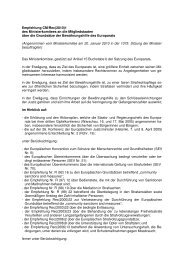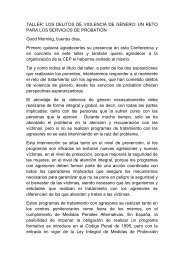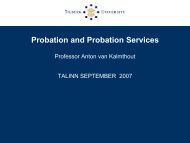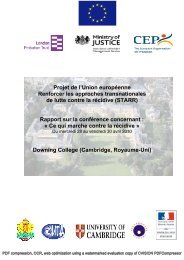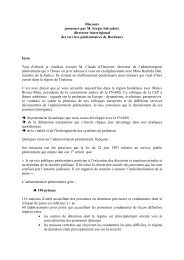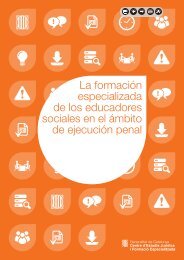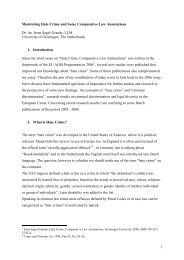ANNUAL REPORT - CEP, the European Organisation for Probation
ANNUAL REPORT - CEP, the European Organisation for Probation
ANNUAL REPORT - CEP, the European Organisation for Probation
You also want an ePaper? Increase the reach of your titles
YUMPU automatically turns print PDFs into web optimized ePapers that Google loves.
<strong>ANNUAL</strong> <strong>REPORT</strong>
Index (links to pages)<br />
3 Preface - Marc Cerón i Riera, <strong>CEP</strong> President<br />
3 2010: Matching ambition and caution<br />
20 Strategic objective: Raising <strong>the</strong> profile of<br />
probation at a national and a <strong>European</strong> level<br />
21 <strong>European</strong> institutions<br />
5 Activities<br />
21 <strong>European</strong> sector of probation<br />
6 Strategic objective: Unite organisations<br />
and individuals working in probation and<br />
criminal justice<br />
7 Acquiring more members<br />
7 Germany<br />
8 Slovakia and Cyprus<br />
9 Universities<br />
9 EU candidate countries<br />
10 O<strong>the</strong>r organisations and individuals<br />
11 Special target groups<br />
24 <strong>European</strong> professional organisations active<br />
in criminal justice<br />
25 Individual countries<br />
27 Internal organisation<br />
27 Meetings<br />
28 External expertise<br />
30 Workstreams<br />
30 Equipment<br />
11 <strong>European</strong> <strong>Probation</strong> Values<br />
12 Bursaries<br />
32 Income and expenditure<br />
33 Notes to <strong>the</strong> financial report<br />
13 Strategic objective: Enhance <strong>the</strong><br />
professionalization of <strong>the</strong> sector of probation<br />
in Europe Conferences<br />
13 Conferences<br />
33 General<br />
33 Summary of significant accounting policies<br />
33 Employee data<br />
15 Website<br />
16 Email Newsletter<br />
17 Register of Experts<br />
18 <strong>Probation</strong> in Europe<br />
18 EuroVista<br />
<strong>CEP</strong> <strong>ANNUAL</strong> <strong>REPORT</strong> 2010 2
Preface<br />
2010: Matching ambition and caution<br />
In September 2008 <strong>the</strong> worst economic<br />
crisis since <strong>the</strong> Great Depression<br />
broke out. Starting as a banking<br />
crisis, <strong>the</strong> consequences <strong>for</strong> <strong>the</strong><br />
public sector were not yet clear at<br />
<strong>the</strong> time, notably because budgets<br />
<strong>for</strong> 2009 had already been fixed by<br />
autumn 2008. As such, 2010 can be<br />
seen as <strong>the</strong> first full year in which <strong>the</strong><br />
credit crunch impacted on governments<br />
and government-depending<br />
services in Europe, including <strong>the</strong><br />
probation sector.<br />
In May of that same year, <strong>CEP</strong> held<br />
its 10 th General Assembly, in Malaga.<br />
At this event, <strong>the</strong> <strong>CEP</strong> member<br />
organisations discussed <strong>the</strong> priorities<br />
of <strong>CEP</strong> <strong>for</strong> <strong>the</strong> period 2010-<br />
2013. The discussions were clearly<br />
marked by two elements: ambition,<br />
because of <strong>the</strong> incessant developments<br />
of <strong>the</strong> sector of probation in<br />
Europe, and caution, as almost all<br />
<strong>CEP</strong> member organisations were<br />
faced with budget cuts.<br />
In this setting, <strong>the</strong> Assembly accepted<br />
<strong>the</strong> proposals of <strong>the</strong> <strong>CEP</strong> Board to<br />
intensify its contacts with <strong>European</strong><br />
institutions, and most notably with<br />
<strong>the</strong> EU Commission, while maintaining<br />
<strong>the</strong> current pace of development<br />
of activities and services. It agreed<br />
that an expansion of staff capacity<br />
was indispensable. However, <strong>the</strong><br />
members of <strong>CEP</strong> also indicated that<br />
under <strong>the</strong> present economic circumstances<br />
a raise of <strong>the</strong> membership<br />
fees was out of <strong>the</strong> question.<br />
The message <strong>for</strong> <strong>the</strong> <strong>CEP</strong> Board<br />
was clear: in <strong>the</strong> coming years until<br />
<strong>the</strong> next General Assembly in 2013,<br />
<strong>CEP</strong> has to work as cost-effective<br />
as possible, while actively look <strong>for</strong><br />
additional funding, and work on<br />
a plan that can be presented to<br />
its members at <strong>the</strong> next General<br />
Assembly on how it can cover all its<br />
operating costs with <strong>the</strong> membership<br />
fees.<br />
Anticipating on <strong>the</strong> conclusion that<br />
additional funding had to be sought,<br />
<strong>CEP</strong> had applied <strong>for</strong> an operating<br />
grant <strong>for</strong> <strong>the</strong> year 2010 under <strong>the</strong><br />
criminal justice funding programme<br />
of <strong>the</strong> <strong>European</strong> Commission. Even<br />
be<strong>for</strong>e it was clear whe<strong>the</strong>r or not<br />
<strong>the</strong> <strong>European</strong> Commission would<br />
award a grant to <strong>CEP</strong>, <strong>the</strong> application<br />
turned out to be very useful.<br />
Be<strong>for</strong>e <strong>the</strong> application, <strong>CEP</strong> would<br />
only draw up a global budget of <strong>the</strong><br />
next year. For <strong>the</strong> operating grant<br />
application however, it had to draw<br />
up an annual plan, a budget which<br />
was specified on action level, as<br />
well as an annual report over <strong>the</strong><br />
previous year. This exercise proved<br />
to be very useful, and this more<br />
structured approach to prepare <strong>for</strong><br />
<strong>the</strong> coming (financial) year was welcomed<br />
with enthusiasm by <strong>the</strong> new<br />
<strong>CEP</strong> Board, which regarded this new<br />
way of working as an important step<br />
in <strong>the</strong> professional development of<br />
<strong>the</strong> organisation of <strong>CEP</strong>.<br />
Just two weeks after <strong>the</strong> General<br />
Assembly in Malaga, <strong>CEP</strong> was<br />
in<strong>for</strong>med that <strong>the</strong> operating grant<br />
had been awarded. This enabled<br />
<strong>CEP</strong> to start to implement <strong>the</strong> strategy<br />
of <strong>the</strong> new <strong>CEP</strong> Board elected<br />
at <strong>the</strong> General Assembly in Malaga,<br />
to realize under <strong>the</strong> current circumstances<br />
its core objectives of:<br />
• Uniting those working in probation<br />
and criminal justice, by fur<strong>the</strong>r<br />
expanding <strong>the</strong> membership of probation<br />
(related) organisations and<br />
individuals working in probation<br />
in those countries that belong to<br />
<strong>the</strong> Council of Europe and are not<br />
yet represented at <strong>CEP</strong> level, thus<br />
reflecting <strong>the</strong> diversity of probation<br />
practice across Europe, unified by<br />
<strong>the</strong> principles of <strong>CEP</strong>. A special mention<br />
should be made <strong>for</strong> increasing<br />
<strong>the</strong> <strong>CEP</strong> membership among Universities<br />
and Research Centres, to<br />
add value to <strong>the</strong> strong message<br />
promoted by <strong>CEP</strong> that probation is<br />
a viable option in <strong>the</strong> management<br />
of offenders<br />
• Professionalizing <strong>the</strong> sector of probation<br />
in Europe by increasing <strong>the</strong><br />
relevance and quality of <strong>CEP</strong> conferences,<br />
improving <strong>the</strong> means of<br />
communication, by enhancing <strong>the</strong><br />
use of <strong>the</strong> <strong>CEP</strong> Register of Experts<br />
and by actively taking o<strong>the</strong>r initiatives<br />
contributing to this goal<br />
• Raising <strong>the</strong> profile of probation at<br />
both a <strong>European</strong> level, by intensifying<br />
its collaboration with <strong>European</strong><br />
institutions and organisations, and<br />
a national level by supporting member<br />
organisations in <strong>the</strong>ir advocacy<br />
<strong>for</strong> probation<br />
• Fur<strong>the</strong>r developing <strong>CEP</strong> as a fullservice,<br />
financially independent<br />
member-organisation.<br />
<strong>CEP</strong> <strong>ANNUAL</strong> <strong>REPORT</strong> 2010 3
Preface<br />
2010: Matching ambition and caution<br />
In this report <strong>the</strong> activities of <strong>CEP</strong><br />
in <strong>the</strong> year 2010 are presented. The<br />
report is structured in accordance<br />
with <strong>the</strong> <strong>CEP</strong> Annual Plan 2010<br />
which gave a description of its<br />
planned actions in <strong>the</strong> three fields of<br />
<strong>the</strong> main objectives of <strong>CEP</strong> (to unite<br />
<strong>the</strong> sector of probation in Europe,<br />
to enhance its professionalization,<br />
to streng<strong>the</strong>n its profile), followed<br />
by a description of <strong>the</strong> developments<br />
in <strong>the</strong> internal organisation.<br />
To this report text boxes have been<br />
added in which <strong>the</strong> planned actions<br />
mentioned in <strong>the</strong> annual plan 2010<br />
are compared with <strong>the</strong> real actions<br />
executed.<br />
I hope that in <strong>the</strong> following chapters<br />
you will find in<strong>for</strong>mation of interest<br />
to you and at <strong>the</strong> same time that you<br />
get a sense of <strong>the</strong> enthusiasm and<br />
commitment of <strong>the</strong> <strong>CEP</strong> staff and<br />
<strong>the</strong> Board.<br />
Marc Cerón I Riera<br />
<strong>CEP</strong> President<br />
<strong>CEP</strong> <strong>ANNUAL</strong> <strong>REPORT</strong> 2010 4
Xxxx Activities<br />
<strong>CEP</strong> is <strong>the</strong> <strong>European</strong> organisation <strong>for</strong> probation. It believes that a society built on<br />
<strong>the</strong> principles of social inclusion provides <strong>the</strong> best protection <strong>for</strong> communities<br />
from <strong>the</strong> harm and distress caused by crime. Committed to unite organizations<br />
and individual persons all over Europe sharing <strong>the</strong>se same principles, <strong>CEP</strong> aims<br />
to enhance <strong>the</strong> professionalisation of <strong>the</strong> probation sector and to raise <strong>the</strong> profile<br />
of probation at a national and a <strong>European</strong> level.<br />
This Annual Report 2010 provides an overview of <strong>the</strong> activities of <strong>CEP</strong> in 2010,<br />
classified by <strong>the</strong> three main strategic objectives. The report is published digitally.<br />
Clickable links refer to relevant web pages.<br />
<strong>CEP</strong> <strong>ANNUAL</strong> <strong>REPORT</strong> 2010 5
Strategic objective:<br />
Unite organisations and individuals working in probation and<br />
criminal justice<br />
Every Board term <strong>CEP</strong> has managed<br />
to enlarge its network by recruiting<br />
more member organisations. <strong>CEP</strong><br />
will continue to do this, ideologically<br />
motivated to unite all organisations<br />
active in <strong>the</strong> field of probation in<br />
Europe, and practically motivated<br />
since more members constitute a<br />
firmer base <strong>for</strong> growth of <strong>CEP</strong>. In<br />
practice many organisations became<br />
a member after <strong>CEP</strong> had outlined <strong>the</strong><br />
benefits that member organisations<br />
have from <strong>CEP</strong>. In 2010, in its ef<strong>for</strong>ts<br />
to acquire more members, <strong>CEP</strong> has<br />
given priority to targeting potential<br />
member organisations which will<br />
increase <strong>the</strong> impact of <strong>CEP</strong> as <strong>the</strong><br />
<strong>European</strong> advocate <strong>for</strong> <strong>the</strong> sector of<br />
probation. That means that <strong>CEP</strong> first<br />
and <strong>for</strong>emost concentrated on:<br />
• Acquiring more members among<br />
<strong>the</strong> institutions responsible <strong>for</strong><br />
probation in Germany, i.e. <strong>the</strong> Ministries<br />
of Justice of <strong>the</strong> German<br />
States and <strong>the</strong> federal Ministry of<br />
Justice, as <strong>the</strong> biggest EU member<br />
state was underrepresented<br />
in <strong>CEP</strong><br />
• Trying to include potential member<br />
organisations from Slovakia<br />
and Cyprus in <strong>the</strong> network of <strong>CEP</strong>,<br />
since <strong>the</strong>se countries were <strong>the</strong> only<br />
EU Members States not yet represented<br />
in <strong>CEP</strong><br />
• Gaining <strong>the</strong> membership of at least<br />
five universities in Europe which<br />
contribute to <strong>the</strong> geographical<br />
spread of <strong>the</strong> academic representation<br />
in <strong>CEP</strong>. At <strong>the</strong> beginning of 2010<br />
<strong>the</strong> member universities of <strong>CEP</strong> only<br />
represented England&Wales, Scotland<br />
and <strong>the</strong> Ne<strong>the</strong>rlands; in addition<br />
one lecturer of <strong>the</strong> University of<br />
Bucharest was member at individual<br />
base<br />
• Converting <strong>the</strong> good contacts that<br />
<strong>CEP</strong> has in various EU candidate<br />
Member States (Croatia, Turkey,<br />
Macedonia) into memberships.<br />
United Europe<br />
<strong>CEP</strong> <strong>ANNUAL</strong> <strong>REPORT</strong> 2010 6
Strategic objective:<br />
Unite organisations and individuals working in probation and<br />
criminal justice<br />
Acquiring more members<br />
Germany<br />
In 2008 and 2009, <strong>CEP</strong> decisively<br />
sought contact with Ministries of<br />
Justice at national and Land-level.<br />
Already early in 2010 this paid off<br />
when <strong>the</strong> Ministry of Justice of <strong>the</strong><br />
German State of Baden-Württemberg<br />
joined <strong>CEP</strong> in January. This<br />
would remain <strong>the</strong> only concrete<br />
success in acquiring new members<br />
from Germany <strong>for</strong> <strong>the</strong> rest of<br />
<strong>the</strong> year. Shortly after welcoming<br />
its first Ministry of Justice from Germany<br />
among its members, <strong>CEP</strong><br />
managed to put <strong>the</strong> <strong>CEP</strong> membership<br />
on <strong>the</strong> agenda of <strong>the</strong> regular<br />
bilateral meeting between <strong>the</strong><br />
Dutch Minister of Justice Hirsch-<br />
Ballin and <strong>the</strong> German Minister of<br />
Justice Mrs. Leu<strong>the</strong>usser-Schnarrenberger,<br />
in January 2010. Earlier<br />
contact by email and telephone with<br />
<strong>the</strong> Bundesministerium resulted in a<br />
refusal to become member of <strong>CEP</strong>,<br />
as <strong>the</strong> Bundesministerium has <strong>the</strong><br />
point of view that <strong>the</strong> competency<br />
<strong>for</strong> probation lays at <strong>the</strong> level of<br />
<strong>the</strong> Länder. Although this is true,<br />
<strong>the</strong> Bundesministerium remains<br />
responsible <strong>for</strong> <strong>the</strong> implementation<br />
of international regulations in <strong>the</strong><br />
field of probation, such as <strong>the</strong> EU<br />
Framework Decision 2008/JHA/947,<br />
on <strong>the</strong> mutual recognition of probation<br />
sanctions and alternative<br />
measures. Minister Hirsch Ballin, a<br />
warm supporter of <strong>CEP</strong>, stressed<br />
<strong>the</strong> importance of <strong>the</strong> membership<br />
with his German colleague. Minister<br />
Leu<strong>the</strong>usser promised she would<br />
reconsider <strong>the</strong> <strong>CEP</strong> membership. In<br />
March, however, <strong>the</strong> Bundesministerium<br />
declined a written invitation<br />
of <strong>CEP</strong> to become member <strong>for</strong> <strong>the</strong><br />
sole reason that under <strong>the</strong> current<br />
budgetary situation <strong>CEP</strong> membership<br />
was not possible. However, <strong>the</strong><br />
Minister indicated that she was willing<br />
to reconsider <strong>CEP</strong> membership<br />
when <strong>the</strong> budgetary situation would<br />
be more favorable.<br />
Equally in March <strong>CEP</strong> followed<br />
up its contacts in <strong>the</strong> States of<br />
Schleswig-Holstein and Meckelenburg-Vorpommern,<br />
after first<br />
getting in touch with <strong>the</strong> Justizministeriums<br />
in 2009. Both indicated<br />
that due to budgetary reasons,<br />
<strong>the</strong>y could not become <strong>CEP</strong> member<br />
in 2010.<br />
Registration at <strong>the</strong> <strong>CEP</strong> conference in Frankfurt in December<br />
In February <strong>the</strong> Secretary General<br />
travelled to Stuttgart, in order to<br />
present on <strong>the</strong> current developments<br />
in probation in Europe at<br />
a conference organised by a professional<br />
organisation <strong>for</strong> staff<br />
working in probation in Germany<br />
(PräventSozial Justiznahe Soziale<br />
Dienste gemeinnützige GmbH). This<br />
was an ideal opportunity to promote<br />
<strong>the</strong> name of <strong>CEP</strong> at <strong>the</strong> level<br />
of probation practitioners, which<br />
would make <strong>CEP</strong> better known<br />
in different echelons of probation<br />
organizations all over Germany.<br />
<strong>CEP</strong> <strong>ANNUAL</strong> <strong>REPORT</strong> 2010 7
Strategic objective:<br />
Unite organisations and individuals working in probation and<br />
criminal justice<br />
In June <strong>the</strong> Secretary General had<br />
<strong>the</strong> opportunity to be a presenter a<br />
conference on transition management<br />
in Frankfurt. As this is a topical<br />
issue in Germany, <strong>the</strong> conference<br />
was a good occasion to meet delegates<br />
of Ministries of Justice with<br />
which <strong>CEP</strong> was not in contact be<strong>for</strong>e.<br />
This proved to be indeed <strong>the</strong> case,<br />
as <strong>the</strong> Secretary General got into<br />
contact with a representative from<br />
<strong>the</strong> Ministry of Justice of Saarland.<br />
The Secretary General of <strong>CEP</strong> travelled<br />
to two German States early<br />
December. In Magdeburg he presented<br />
on a conference on probation<br />
organised by <strong>the</strong> Landesverband für<br />
Straffälligen- und Bewährungshilfe<br />
Sachsen-Anhalt e.V. and managed<br />
to establish contacts with representatives<br />
of <strong>the</strong> Ministry of Justice<br />
of Sachsen-Anhalt. One day later,<br />
he attended <strong>the</strong> <strong>CEP</strong> conference in<br />
Frankfurt, where he met delegates<br />
from <strong>the</strong> Ministries of Justice of<br />
Baden-Württemberg, Hessen and<br />
Meckelenburg-Vorpommern.<br />
In September <strong>the</strong> <strong>CEP</strong> Liaison<br />
Officer attended a meeting of Violence<br />
Prevention Network in Berlin.<br />
On <strong>the</strong> basis of <strong>the</strong> list of participants,<br />
this event was well suited<br />
to get in contact with delegates of<br />
<strong>the</strong> Ministries of Justice of <strong>the</strong> State<br />
of Brandenburg. This resulted in<br />
closer contact with <strong>the</strong> Ministry, but<br />
not in a membership of <strong>CEP</strong>, due to<br />
budgetary reasons.<br />
Planned<br />
Executed<br />
Making 4 travels to visit 8 German Länder to interest <strong>the</strong>se<br />
<strong>for</strong> <strong>CEP</strong> membership<br />
<strong>CEP</strong> visited four German Länder in four travels. <strong>CEP</strong> raised<br />
<strong>the</strong> possibility to become member of <strong>CEP</strong> with delegates<br />
of Ministries of Justice in 8 German States, three of which<br />
<strong>CEP</strong> wasn’t in contact be<strong>for</strong>e (Hessen, Saarland and<br />
Sachsen-Anhalt).<br />
One Bundesland became member of <strong>CEP</strong><br />
Slovakia and Cyprus<br />
<strong>CEP</strong> was one of <strong>the</strong> project partners<br />
of <strong>the</strong> EU-funded project Preparation<br />
of <strong>the</strong> practical implementation<br />
of <strong>the</strong> framework decision on<br />
<strong>the</strong> mutual recognition of probation<br />
measures, led by <strong>the</strong> Federal Public<br />
Service Justice of Belgium. At <strong>the</strong><br />
final conference in July in Durbuy,<br />
<strong>the</strong> <strong>CEP</strong> President (representing<br />
Catalonia at <strong>the</strong> conference), one<br />
of <strong>the</strong> two Vice-Presidents (IE), one<br />
Board Member (LU) and <strong>the</strong> <strong>CEP</strong><br />
Secretary General met with representatives<br />
from <strong>the</strong> Ministries of<br />
Justice from Cyprus and Slovakia.<br />
In <strong>the</strong> second half of <strong>the</strong> year <strong>the</strong>se<br />
contacts were intensified.<br />
In <strong>the</strong> case of Slovakia, this led<br />
to a visit of <strong>the</strong> Secretary Gene ral<br />
to <strong>the</strong> Secretary of State of<br />
<strong>the</strong> Ministry of Justice in Bratislava<br />
and to <strong>the</strong> Constantine <strong>the</strong><br />
Philosopher University in Nitra, in<br />
December. The same month, <strong>the</strong><br />
university decided to become<br />
member of <strong>CEP</strong>. The International<br />
Secretary of State was favorable<br />
towards <strong>for</strong>mally adhering to <strong>CEP</strong>.<br />
The Minister of Justice herself is<br />
currently considering <strong>the</strong> membership<br />
of <strong>CEP</strong>.<br />
The contacts with Cyprus however<br />
did not result in a visit in 2010. The<br />
Ministry of Justice argued that <strong>the</strong><br />
membership of <strong>CEP</strong> wouldn’t be<br />
relevant, as Cyprus does not have<br />
a probation service. This being <strong>the</strong><br />
official stance of <strong>the</strong> Ministry, <strong>CEP</strong><br />
will keep on trying to convince <strong>the</strong><br />
Ministry of <strong>the</strong> importance of <strong>the</strong><br />
<strong>CEP</strong> <strong>ANNUAL</strong> <strong>REPORT</strong> 2010 8
Strategic objective:<br />
Unite organisations and individuals working in probation and<br />
criminal justice<br />
EU Framework Decision on probation<br />
measures and alternative sanctions,<br />
and <strong>the</strong>re<strong>for</strong>e will continue to<br />
urge <strong>for</strong> a meeting with <strong>the</strong> Ministry<br />
to discuss <strong>the</strong> implementation of<br />
this Framework Decision.<br />
Planned<br />
Executed<br />
Making 2-day visits to Cyprus and Slovakia<br />
Slovakia was visited, resulting in <strong>the</strong> membership of <strong>the</strong><br />
Constantine <strong>the</strong> Philosopher University in Nitra, and<br />
<strong>the</strong> consideration of <strong>the</strong> Ministry of Justice to become<br />
<strong>CEP</strong> member (decision still pending). The planned trip to<br />
Cyprus has been postponed to 2011<br />
Universities<br />
Via <strong>the</strong> Register of Experts, Prof. vidual member of <strong>CEP</strong> in January<br />
Martine Evans-Herzog of <strong>the</strong> Université<br />
de Reims (FR) became indiversity<br />
of Applied Sciences (NL)<br />
2010. One month later Avans Uni-<br />
Planned To gain <strong>the</strong> membership of at least five universities in<br />
Europe which contribute to <strong>the</strong> geographical spread of <strong>the</strong><br />
academic representation in <strong>CEP</strong><br />
Executed Seven new universities joined <strong>CEP</strong> in 2010. Four of <strong>the</strong>se<br />
are from countries which were not yet represented in <strong>the</strong><br />
academic network of <strong>CEP</strong><br />
became <strong>CEP</strong> member. In April <strong>the</strong><br />
De Mont<strong>for</strong>t University of Leicester<br />
(ENG) joined, followed in November<br />
2010 by <strong>the</strong> Constantine <strong>the</strong><br />
Philosopher University in Nitra (SK)<br />
and <strong>the</strong> University Pompeu Fabra in<br />
Barcelona (CAT). In December 2010<br />
<strong>the</strong> prestigious Institute of Criminology<br />
of <strong>the</strong> University of Cambridge<br />
(ENG), as well as <strong>the</strong> Universita’<br />
della Calabria (IT) joined <strong>CEP</strong>.<br />
EU candidate countries<br />
In <strong>the</strong> beginning February 2010,<br />
<strong>the</strong> <strong>CEP</strong> Secretary General visited<br />
<strong>the</strong> Ministry of Justice of Croatia.<br />
His visit must have come at <strong>the</strong><br />
right moment, because <strong>the</strong> Ministry<br />
applied <strong>for</strong> <strong>the</strong> <strong>CEP</strong> membership<br />
shortly after, which led to <strong>the</strong><br />
acceptance of <strong>the</strong> application only<br />
two weeks after <strong>the</strong> Secretary General<br />
returned from Zagreb.<br />
The fact that one of <strong>the</strong> <strong>CEP</strong> Board<br />
Members was Residential Twinning<br />
Advisor based in Ankara helped<br />
<strong>CEP</strong> to develop a good relationship<br />
with <strong>the</strong> Ministry of Justice.<br />
In May 2010 a delegation of <strong>the</strong><br />
Turkish ministry visited <strong>the</strong> <strong>CEP</strong><br />
General Assembly in Malaga, and<br />
4 months later <strong>the</strong> <strong>CEP</strong> Secretary<br />
General attended a conference of<br />
<strong>the</strong> Ministry of Justice in Ankara,<br />
where he also acted as a speaker.<br />
At this occasion <strong>the</strong> <strong>CEP</strong> Secretary<br />
General met with <strong>the</strong> General<br />
Director of Prisons and Detention<br />
Houses of <strong>the</strong> Turkish Ministry of<br />
Justice; a planned meeting with<br />
<strong>the</strong> minister of Justice was cancelled<br />
by <strong>the</strong> Ministry at <strong>the</strong> last moment.<br />
In his speech at <strong>the</strong> conference <strong>the</strong><br />
<strong>CEP</strong> <strong>ANNUAL</strong> <strong>REPORT</strong> 2010 9
Strategic objective:<br />
Unite organisations and individuals working in probation and<br />
criminal justice<br />
Director General announced that he<br />
was favorable toward <strong>CEP</strong> membership,<br />
but <strong>the</strong> decision of <strong>the</strong> <strong>for</strong>mal<br />
application had to be taken by <strong>the</strong><br />
Minister. This being <strong>the</strong> case, <strong>CEP</strong><br />
has planned to visit Turkey again in<br />
2011 in order to speak to <strong>the</strong> Minister<br />
of Justice.<br />
In June <strong>the</strong> Ministry of Justice of<br />
Macedonia showed interest in <strong>the</strong><br />
<strong>CEP</strong> membership by email. <strong>CEP</strong><br />
has planned a visit to <strong>the</strong> ministry<br />
in order to discuss <strong>the</strong> membership<br />
in 2011.<br />
Planned<br />
Visits to Turkey and Croatia to gain <strong>the</strong> <strong>CEP</strong> membership<br />
of <strong>the</strong> Ministries of Justice<br />
Executed<br />
Both visits were made. The Croatian Ministry of Justice<br />
became member very shortly after <strong>the</strong> visit. Turkey<br />
hasn’t applied yet but seems to be favorable toward<br />
membership<br />
Secretary General Leo Tigges<br />
meeting with officials of <strong>the</strong> Turkish<br />
Ministry of Justice<br />
O<strong>the</strong>r organisations and individuals<br />
In addition to <strong>the</strong> probation organisations<br />
that <strong>CEP</strong> had actively targeted<br />
to enlarge its network in 2010,<br />
<strong>CEP</strong> had <strong>the</strong> pleasure to welcome<br />
also o<strong>the</strong>r new members. In March<br />
2010, <strong>the</strong> <strong>CEP</strong> Secretary General<br />
travelled to Greece, in order to<br />
visit EPANODOS, an NGO which in<br />
2009 had become <strong>the</strong> first member<br />
organisation to represent Greece<br />
in <strong>CEP</strong>. The Secretary General also<br />
visited <strong>the</strong> Ministry of Justice to talk<br />
about <strong>CEP</strong> membership. In May,<br />
<strong>the</strong> ministry indeed became member<br />
of <strong>CEP</strong>.<br />
of a <strong>for</strong>mer Board member of <strong>CEP</strong>,<br />
who is currently helping <strong>the</strong> Georgian<br />
government to re<strong>for</strong>m its penal<br />
system.<br />
After intensive contacts with <strong>the</strong><br />
<strong>CEP</strong> President, <strong>the</strong> Catalan NGOs<br />
APIP and INTRESS became member<br />
of <strong>CEP</strong> in April and December<br />
2010 respectively.<br />
Emblem of <strong>the</strong> Ministry of Justice<br />
of Georgia<br />
Similar to Turkey, a delegation of<br />
<strong>the</strong> Georgian Ministry of Justice<br />
attended <strong>the</strong> <strong>CEP</strong> General Assembly<br />
in May in Malaga. Five months<br />
later <strong>the</strong> Ministry of Justice of Georgia<br />
became indeed member of <strong>CEP</strong>.<br />
This quick conversion from a first<br />
contact into a membership was<br />
probably spurred by <strong>the</strong> lobbying<br />
Fur<strong>the</strong>rmore seven probation professionals<br />
became member of <strong>CEP</strong><br />
on an individual basis.<br />
<strong>CEP</strong> <strong>ANNUAL</strong> <strong>REPORT</strong> 2010 10
Strategic objective:<br />
Unite organisations and individuals working in probation and<br />
criminal justice<br />
Special target groups<br />
In probably every country in <strong>the</strong> EU cial needs of <strong>for</strong>eign national prisoners.<br />
In order to raise <strong>the</strong> issue <strong>for</strong> this<br />
<strong>the</strong> number of <strong>for</strong>eign national prisoners<br />
has been growing steadily special target group with its member<br />
over <strong>the</strong> years. There<strong>for</strong>e working organisations, <strong>the</strong> Special Interest<br />
with <strong>for</strong>eign national prisoners has Group (SIG) <strong>for</strong> Foreign national<br />
become a high priority in prison systems<br />
all around Europe. However,<br />
Prisoners was established in 2008.<br />
many <strong>CEP</strong> member organisations In 2009 <strong>CEP</strong> started to develop an<br />
have not begun to address <strong>the</strong> spe-<br />
action plan <strong>for</strong> Foreign National Pris-<br />
Planned Two Board meetings will take place to develop an action<br />
plan <strong>for</strong> <strong>the</strong> promotion of Foreign National Prisoners as a<br />
group that requires special care in probation systems at a<br />
national level<br />
Executed No Board Meetings have taken place due to illness of <strong>the</strong><br />
Chairman of <strong>the</strong> Board<br />
oners, which should be presented in<br />
October 2010. The implementation<br />
of <strong>the</strong> plan <strong>the</strong>n could start by <strong>the</strong><br />
beginning of 2011.<br />
However, in <strong>the</strong> first half of 2010 <strong>the</strong><br />
SIG Board Member who had <strong>the</strong><br />
lead in <strong>the</strong> development of <strong>the</strong> action<br />
plan fell severely ill. His recovery<br />
took about six months, which made<br />
<strong>the</strong> SIG made decide to postpone<br />
<strong>the</strong> presentation of its action plan to<br />
March 2011. In <strong>the</strong> last three months<br />
of <strong>the</strong> year intensive communication<br />
between <strong>the</strong> o<strong>the</strong>r SIG Board Members<br />
took place in order to prepare<br />
<strong>the</strong> rescheduled presentation.<br />
<strong>European</strong> <strong>Probation</strong> Values<br />
In 2009 <strong>CEP</strong> started to define a collective<br />
vision and set of basic values<br />
that are shared by all members.<br />
Since <strong>CEP</strong> is <strong>the</strong> largest network in<br />
probation in Europe, <strong>the</strong> creation<br />
of <strong>the</strong>se <strong>European</strong> values can be<br />
seen as <strong>the</strong> definition of a <strong>European</strong><br />
concept of probation. Assisted<br />
in this task by Prof. Rob Canton,<br />
who -toge<strong>the</strong>r with Prof. Anton van<br />
Kalmthout- was at <strong>the</strong> basis of <strong>the</strong><br />
draft of <strong>the</strong> Council’s of Europe Recommendation<br />
on <strong>Probation</strong>, <strong>CEP</strong><br />
presented its <strong>European</strong> <strong>Probation</strong><br />
Values at <strong>the</strong> <strong>CEP</strong> General Assembly<br />
in Malaga, where <strong>the</strong>se were letter, Ilina Taneva, secretary to <strong>the</strong><br />
In <strong>the</strong> March issue of <strong>the</strong> <strong>CEP</strong> News-<br />
amended and adopted by <strong>the</strong> members<br />
of <strong>CEP</strong>. In October <strong>the</strong> official Council of Europe, illustrated <strong>the</strong><br />
Penological Council (PC-CP) of <strong>the</strong><br />
text of <strong>the</strong> values, originally written importance of this base document.<br />
in English, was fixed.<br />
“The 18 <strong>CEP</strong> values are highlighting<br />
Planned To finalize <strong>the</strong> <strong>European</strong> <strong>Probation</strong> Values and translate<br />
<strong>the</strong>se in French and German<br />
Executed The <strong>European</strong> <strong>Probation</strong> Values have been finalized and<br />
translated<br />
<strong>CEP</strong> <strong>ANNUAL</strong> <strong>REPORT</strong> 2010 11
Strategic objective:<br />
Unite organisations and individuals working in probation and<br />
criminal justice<br />
and commenting <strong>the</strong> most important<br />
standards contained in <strong>the</strong><br />
Council of Europe’s Recommendation<br />
on <strong>Probation</strong>. The values are<br />
addressing in <strong>the</strong> first place <strong>the</strong><br />
practitioners who work with offenders,<br />
while as <strong>the</strong> Recommendation<br />
is addressing also <strong>the</strong> national<br />
authorities which should ensure <strong>the</strong><br />
legal and practical basis needed <strong>for</strong><br />
a high quality probation work”.<br />
Bursaries<br />
Traditionally <strong>CEP</strong> reserves a small<br />
part of its budget <strong>for</strong> supporting<br />
delegates of organisations active<br />
in probation that have insufficient<br />
financial means <strong>for</strong> attending conferences<br />
abroad. As notably <strong>the</strong>se<br />
countries will benefit from <strong>European</strong><br />
knowledge and in<strong>for</strong>mation<br />
exchange, <strong>CEP</strong> considers it a duty<br />
to connect <strong>the</strong>m to <strong>the</strong> <strong>European</strong><br />
probation community.<br />
In 2010, all requests <strong>for</strong> bursaries (2), Turkey (2) and Georgia (1), all<br />
were accepted by <strong>CEP</strong>. Seven bursaries<br />
have been awarded to del-<br />
General Assembly and following<br />
with <strong>the</strong> purpose to attend <strong>the</strong> <strong>CEP</strong><br />
egates from Greece (2), Romania conference in May, in Malaga.<br />
Planned To provide a maximum of 20 bursaries to enable probation<br />
professionals to attend meetings in o<strong>the</strong>r <strong>European</strong> countries<br />
Executed Seven bursaries were provided<br />
<strong>CEP</strong> <strong>ANNUAL</strong> <strong>REPORT</strong> 2010 12
Strategic objective:<br />
Enhance <strong>the</strong> professionalization of <strong>the</strong> sector of probation in Europe<br />
In <strong>the</strong> last ten years, <strong>the</strong> increased<br />
importance of <strong>the</strong> probation sector<br />
in all criminal justice systems<br />
in Europe has brought about an<br />
unprecedented dynamism. While<br />
some countries are in <strong>the</strong> process<br />
of developing community sanctions<br />
and have been setting up national<br />
probation services, o<strong>the</strong>r more<br />
longstanding organisations are<br />
focused on meeting <strong>the</strong> changing<br />
needs of changing societies, taking<br />
into account <strong>the</strong> specific sociocultural<br />
circumstances and <strong>the</strong> context<br />
of <strong>the</strong> national criminal justice<br />
system(s) in which <strong>the</strong>y operate. The<br />
<strong>European</strong> Union and <strong>the</strong> Council of<br />
Europe have become major actors<br />
in <strong>the</strong> development of a ‘<strong>European</strong><br />
probation’. The academic world is<br />
showing a growing interest in <strong>the</strong><br />
effectiveness of probation methods<br />
and <strong>the</strong> underlying processes lead<br />
ingto successful probation practice,<br />
which enhances <strong>the</strong> development<br />
of a true ‘science of probation’. And<br />
an increasing number of enterprises<br />
active in <strong>the</strong> realm of security discovers<br />
<strong>the</strong> sector of probation as<br />
a market.<br />
The sector of probation thus is<br />
growing, along with its need <strong>for</strong><br />
exchange of best practices, <strong>for</strong><br />
debate on different perceptions of<br />
probation, <strong>for</strong> international benchmarks<br />
and comparable data and<br />
<strong>for</strong> in<strong>for</strong>mation from o<strong>the</strong>r <strong>European</strong><br />
countries to improve <strong>the</strong> functioning<br />
of probation services.<br />
Traditionally <strong>CEP</strong> has met this need<br />
by organising high-quality conferences<br />
on probation topics in close<br />
cooperation with <strong>the</strong> host countries.<br />
Although it has made increased use<br />
of ICT facilities in <strong>the</strong> last five years<br />
in order to contribute to <strong>the</strong> continuous<br />
professionalization of probation<br />
services in Europe by facilitating <strong>the</strong><br />
exchange of in<strong>for</strong>mation, organising<br />
conferences has always been<br />
an important <strong>CEP</strong>-activity to bring<br />
toge<strong>the</strong>r professionals in probation<br />
from all over Europe.<br />
Conferences<br />
Over <strong>the</strong> years <strong>CEP</strong> has steadily<br />
expanded <strong>the</strong> annual number of<br />
conferences and expert meetings<br />
that it (co-)organises. By joining<br />
in <strong>European</strong>-funded projects as a<br />
project partner, <strong>CEP</strong> has managed<br />
to raise <strong>the</strong> annual number of conferences<br />
and expert meetings even<br />
fur<strong>the</strong>r in 2010. The scheme on <strong>the</strong><br />
following page gives an overview of<br />
<strong>the</strong> events held under <strong>the</strong> auspices<br />
of <strong>CEP</strong> in 2010.<br />
<strong>European</strong> conference “<strong>Probation</strong> Works”, in Malaga<br />
<strong>CEP</strong> <strong>ANNUAL</strong> <strong>REPORT</strong> 2010 13
Strategic objective:<br />
Enhance <strong>the</strong> professionalization of <strong>the</strong> sector of probation in Europe<br />
Spain January <strong>European</strong> expert meeting “Radicalisation in Prison and <strong>Probation</strong>”, in Segovia<br />
<strong>the</strong> event took place in <strong>the</strong> framework of <strong>the</strong> ISEC funded project RIRP<br />
UK April <strong>European</strong> conference “What Works in Reducing Re-offending”, in Cambridge<br />
<strong>the</strong> event took place in <strong>the</strong> framework of <strong>the</strong> ISEC funded project STARR<br />
Spain May <strong>European</strong> conference “<strong>Probation</strong> Works”, in Malaga<br />
<strong>the</strong> event took place in <strong>the</strong> framework of <strong>the</strong> 10 th <strong>CEP</strong> General Assembly<br />
Hungary June <strong>European</strong> expert meeting “What Works with Young Offenders”, in Budapest<br />
<strong>the</strong> event took place in <strong>the</strong> framework of <strong>the</strong> ISEC funded project STARR<br />
UK October <strong>European</strong> conference ‘Engaging with Radicalised Offenders in Prison and<br />
on <strong>Probation</strong>’, in London<br />
<strong>the</strong> event took place in <strong>the</strong> framework of <strong>the</strong> ISEC funded project RIRP<br />
France November <strong>European</strong> expert meeting “Fight against Domestic Violence: Comparative<br />
<strong>European</strong> Practice”, in Paris<br />
<strong>the</strong> event took place in <strong>the</strong> framework of <strong>the</strong> ISEC funded project STARR<br />
Germany December <strong>European</strong> conference <strong>Probation</strong> in Europe: “Social Work - Risk Management -<br />
Community”, in Frankfurt<br />
<strong>European</strong> expert meeting “Fight against Domestic Violence: Comparative <strong>European</strong> Practice”, in Paris<br />
<strong>CEP</strong> <strong>ANNUAL</strong> <strong>REPORT</strong> 2010 14
Strategic objective:<br />
Enhance <strong>the</strong> professionalization of <strong>the</strong> sector of probation in Europe<br />
Website<br />
In 2007, when <strong>CEP</strong> decided that it<br />
should develop <strong>the</strong> organisation into<br />
an independent full-service professional<br />
organisation <strong>for</strong> <strong>the</strong> sector<br />
of probation in Europe, it identified<br />
<strong>the</strong> new ICT communication possibilities<br />
as <strong>the</strong> most (cost-)effective<br />
way to connect with its member<br />
organisations all around <strong>the</strong><br />
continent and beyond. As such, a<br />
new up-to-date website was developed<br />
and expanded rapidly over <strong>the</strong><br />
years. As a result of <strong>the</strong> development<br />
of many new ICT products, <strong>the</strong><br />
development of <strong>the</strong> <strong>CEP</strong> website<br />
is a continuing task, guided by <strong>the</strong><br />
principles to facilitate <strong>the</strong> (digital)<br />
in<strong>for</strong>mation exchange in <strong>the</strong> sector<br />
of probation in Europe, and to work<br />
more cost-effectively as an umbrella<br />
organisation.<br />
For 2010, <strong>CEP</strong> gave priority to adding<br />
a <strong>for</strong>um to its website, which <strong>the</strong><br />
<strong>CEP</strong> members could use as a digital<br />
plat<strong>for</strong>m <strong>for</strong> <strong>the</strong> interactive exchange<br />
of in<strong>for</strong>mation among each o<strong>the</strong>r.<br />
Secondly, with an ever growing<br />
number of documents to be made<br />
accessible via <strong>the</strong> <strong>CEP</strong> website, <strong>the</strong><br />
accessibility of in<strong>for</strong>mation on <strong>the</strong><br />
website needed to optimized. As a<br />
third main item <strong>for</strong> <strong>the</strong> development<br />
of <strong>the</strong> <strong>CEP</strong> website, it was planned<br />
to bring <strong>the</strong> French version of <strong>the</strong><br />
website in line with <strong>the</strong> (more developed)<br />
English version, by translating<br />
<strong>the</strong> ‘missing’ parts.<br />
All <strong>the</strong>se three priorities were realized<br />
in 2010. In April a membersonly<br />
<strong>for</strong>um was added to <strong>the</strong> <strong>CEP</strong><br />
website. By integrating Google Site<br />
search, <strong>the</strong> most powerful and most<br />
widely used search engine in <strong>the</strong><br />
world, in www.cep-probation.org,<br />
<strong>the</strong> biggest repository of in<strong>for</strong>mation<br />
on probation in Europe on <strong>the</strong> world<br />
wide web was made easily accessible<br />
<strong>for</strong> visitors of <strong>the</strong> website.<br />
Also some additional infrastructural<br />
changes of <strong>the</strong> website were made<br />
in order to optimize <strong>the</strong> ‘searchability’<br />
of <strong>the</strong> <strong>CEP</strong> website. In October<br />
<strong>the</strong> ‘missing parts’ on <strong>the</strong> French<br />
version of <strong>the</strong> website were translated<br />
from English and put online.<br />
Apart from <strong>the</strong>se priorities, <strong>the</strong> <strong>CEP</strong><br />
website was expanded with several<br />
o<strong>the</strong>r modules that contribute to<br />
achieving a greater cost-effectiveness<br />
and a more efficient use of <strong>the</strong><br />
website. This was made possible<br />
by an increase of <strong>the</strong> staff capacity<br />
of <strong>CEP</strong>. In <strong>the</strong> first half of <strong>the</strong><br />
year <strong>the</strong> Communications Officer<br />
of <strong>CEP</strong> effectively combined two<br />
functions which were split in two<br />
different functions in <strong>the</strong> second half<br />
of <strong>the</strong> year after <strong>the</strong> operating grant<br />
became available: Communications<br />
Officer and Liaison Officer. As<br />
<strong>the</strong> (pre-operating grant ) Communications<br />
Officer became <strong>the</strong> Liaison<br />
Officer, a new Communication<br />
Officer was assigned in July.<br />
Since <strong>the</strong>n a module to create web<br />
<strong>for</strong>ms was added to <strong>the</strong> content<br />
management system of <strong>the</strong> website.<br />
This meant that <strong>CEP</strong> could make<br />
web <strong>for</strong>ms in-house; previously<br />
<strong>the</strong>se had to be made externally.<br />
As such <strong>the</strong> module made it more<br />
easy to use web <strong>for</strong>ms in <strong>the</strong> digital<br />
communications with <strong>the</strong> <strong>CEP</strong> mem-<br />
<strong>CEP</strong> <strong>ANNUAL</strong> <strong>REPORT</strong> 2010 15
Strategic objective:<br />
Enhance <strong>the</strong> professionalization of <strong>the</strong> sector of probation in Europe<br />
bers, while it also saves costs on <strong>the</strong><br />
budget <strong>for</strong> external web services.<br />
Ano<strong>the</strong>r module was added by<br />
which visitors of <strong>the</strong> website could<br />
quickly in<strong>for</strong>m o<strong>the</strong>rs about news<br />
on <strong>the</strong> <strong>CEP</strong> website. This ‘tell-afriend’<br />
module is an effective way<br />
to increase <strong>the</strong> number of visitors to<br />
<strong>the</strong> <strong>CEP</strong> website.<br />
In order to analyse how <strong>the</strong> www.<br />
cep-probation.org is being used by<br />
its visitors, <strong>CEP</strong> integrated a new<br />
statistical programme in its website.<br />
Its old statistical programme<br />
regularly caused dysfunctions on<br />
<strong>the</strong> <strong>CEP</strong> website, as <strong>the</strong> space <strong>for</strong><br />
<strong>the</strong> collection of data (page visits)<br />
was too small. The new statistical<br />
programme, Google Analytics, is<br />
one of <strong>the</strong> most powerful on <strong>the</strong><br />
market.<br />
In December <strong>CEP</strong> started communicating<br />
via social media by making<br />
use of Twitter <strong>for</strong> instant messaging<br />
to all those interested in probation<br />
in Europe.<br />
Planned<br />
To add a <strong>for</strong>um to <strong>the</strong> <strong>CEP</strong> website, as well as a module to make web <strong>for</strong>ms in-house<br />
To translate web text <strong>for</strong>m English into French, in order to bring <strong>the</strong> French version of <strong>the</strong> website in<br />
line with <strong>the</strong> English version<br />
To fur<strong>the</strong>r maintain and develop <strong>the</strong> website<br />
Executed<br />
A <strong>for</strong>um was added to <strong>the</strong> <strong>CEP</strong> website.<br />
In <strong>the</strong> content management system a module was added to make web <strong>for</strong>ms. Several o<strong>the</strong>r modules<br />
and modalities were added to <strong>the</strong> website which enhance <strong>the</strong> efficiency of www.cep-probation.org<br />
and increase <strong>the</strong> cost-effectiveness of <strong>the</strong> work streams of <strong>the</strong> organisation<br />
Email Newsletter<br />
With its email newsletter, which has<br />
an English and a French version,<br />
<strong>CEP</strong> regularly in<strong>for</strong>ms its members<br />
and o<strong>the</strong>rs who are interested<br />
about <strong>the</strong> latest developments in<br />
probation in Europe. As planned,<br />
<strong>CEP</strong> published six issues of <strong>the</strong><br />
<strong>CEP</strong> Newsletter in 2010, sent to<br />
over 1,300 addresses. In addition,<br />
<strong>the</strong> Newsletter is being published<br />
on intranet sites and websites of<br />
several member organisations.<br />
As a part of <strong>the</strong> ef<strong>for</strong>t to increase<br />
<strong>the</strong> cost-efficiency in its work proc-<br />
Planned<br />
Executed<br />
To publish six issues of <strong>the</strong> English and French version of <strong>the</strong> <strong>CEP</strong> Newsletter (costs involved in <strong>the</strong><br />
operating grant budget are : layout, translations, freelance texts, stock photos and sending)<br />
To add a module to <strong>the</strong> content management system of <strong>the</strong> website to keep layout and publication<br />
of <strong>the</strong> newsletter in-house<br />
Six issues of <strong>the</strong> Newsletter were published. The module was implemented five months earlier than<br />
planned; as such <strong>CEP</strong> managed to economize on <strong>the</strong> production costs of <strong>the</strong> Newsletter. A fur<strong>the</strong>r<br />
saving was made as no stock photos were used<br />
<strong>CEP</strong> <strong>ANNUAL</strong> <strong>REPORT</strong> 2010 16
Strategic objective:<br />
Enhance <strong>the</strong> professionalization of <strong>the</strong> sector of probation in Europe<br />
esses, <strong>CEP</strong> planned to purchase a<br />
module which could be added to <strong>the</strong><br />
<strong>CEP</strong> website management system,<br />
in order to keep <strong>the</strong> layout and publication<br />
of <strong>the</strong> Newsletter in-house<br />
(previously layout and publication<br />
were outsourced). With regard to<br />
<strong>the</strong> work planning of <strong>the</strong> Communications<br />
Officer, <strong>the</strong> installation of <strong>the</strong><br />
module was planned in December.<br />
However, shortly after her assignment<br />
in July, <strong>the</strong> new Communications<br />
Officer decided to implement<br />
<strong>the</strong> module as soon as possible, in<br />
order to maximize <strong>the</strong> benefits of <strong>the</strong><br />
cost-efficiency. As such, <strong>the</strong> module<br />
was implemented in August.<br />
Register of Experts<br />
In <strong>the</strong> last few years <strong>CEP</strong> noticed<br />
a clear need among its member<br />
organisations to draw upon expert<br />
knowledge from abroad in order to<br />
fur<strong>the</strong>r develop <strong>the</strong>ir own probation<br />
services. However, to find <strong>the</strong><br />
persons with <strong>the</strong> needed expertise<br />
proved to be difficult. In order to<br />
bring toge<strong>the</strong>r experts in probation<br />
and probation services that wish to<br />
make use of expert knowledge to<br />
improve <strong>the</strong>ir probation practice,<br />
<strong>CEP</strong> took <strong>the</strong> initiative to establish a<br />
Register of Experts in 2009.<br />
The Register is in fact a pool of experts<br />
in probation who can be consulted<br />
by probation services in Europe. In<br />
<strong>the</strong> first stage, experts were invited<br />
to join <strong>the</strong> Register. Once a number<br />
of 20 experts would have joined,<br />
<strong>the</strong> Register would be opened <strong>for</strong><br />
applications from probation organisations,<br />
which was planned <strong>for</strong> 2010.<br />
The Register is developed and managed<br />
by a Board, consisting of three<br />
persons. Two Board meetings were<br />
planned <strong>for</strong> 2010, one in London and<br />
one in Dublin.<br />
As a result of <strong>the</strong> very thorough scrutiny<br />
procedure of candidate experts,<br />
<strong>the</strong> 20 th expert was accepted in<br />
December 2010, so that <strong>the</strong> <strong>CEP</strong><br />
Register of Experts was opened <strong>for</strong><br />
probation services in January 2011.<br />
The Board of <strong>the</strong> Register effectively<br />
communicated regularly by email<br />
and telephone, so no physical Board<br />
meetings were deemed necessary.<br />
Planned<br />
To open <strong>the</strong> Register of Experts <strong>for</strong> requests from probation services<br />
Two Register of Expert Board Meetings (one in London, one in Dublin)<br />
Executed The Register of Experts was opened <strong>for</strong> requests <strong>for</strong>m probation services in December 2010<br />
No physical meetings were held due to effective communication of <strong>the</strong> Board Members via email<br />
and telephone<br />
<strong>CEP</strong> <strong>ANNUAL</strong> <strong>REPORT</strong> 2010 17
Strategic objective:<br />
Enhance <strong>the</strong> professionalization of <strong>the</strong> sector of probation in Europe<br />
<strong>Probation</strong> in Europe<br />
In 2008, <strong>Probation</strong> in Europe, <strong>the</strong><br />
most comprehensive survey of<br />
probation systems and probation<br />
services in Europe today, was published<br />
on <strong>the</strong> initiative of <strong>CEP</strong>. Being<br />
a valuable reference work <strong>for</strong> probation<br />
professionals in <strong>the</strong>ir international<br />
contacts, <strong>the</strong> book was<br />
almost completely sold out within<br />
one year.<br />
After <strong>the</strong> book was sold out, <strong>CEP</strong><br />
agreed with <strong>the</strong> authors of <strong>the</strong> book<br />
that <strong>the</strong> entire content of <strong>Probation</strong><br />
in Europe could be made available<br />
via <strong>the</strong> <strong>CEP</strong> website. In 2010 <strong>the</strong><br />
full descriptions of 32 probations<br />
systems in Europe have become<br />
accessible online, which made <strong>the</strong><br />
<strong>CEP</strong> website <strong>the</strong> biggest repository<br />
of in<strong>for</strong>mation on probation in<br />
Europe on <strong>the</strong> world wide web.<br />
Since <strong>the</strong>se descriptions are very<br />
extensive and sometimes only<br />
a quick overview of a probation<br />
system in one particular country<br />
is needed, <strong>CEP</strong> planned to commission<br />
<strong>the</strong> author of <strong>Probation</strong> in<br />
Europe to make (partly updated)<br />
summaries of all 32 country chapters<br />
which would be made available<br />
via <strong>the</strong> <strong>CEP</strong> website in 2010. This<br />
action was realized at <strong>the</strong> end of<br />
March.<br />
Due to <strong>the</strong> dynamics in <strong>the</strong> sector<br />
of probation in all <strong>European</strong> countries,<br />
<strong>CEP</strong> <strong>for</strong>esees that <strong>the</strong> book<br />
should be revised every two years.<br />
The (online) publication of <strong>the</strong> first<br />
up date was planned <strong>for</strong> <strong>the</strong> end of<br />
2010, but by <strong>the</strong> middle of <strong>the</strong> year<br />
this planning proved to be too ambitious.<br />
For <strong>the</strong> first two revisions, <strong>CEP</strong><br />
managed to secure funding with <strong>the</strong><br />
Dutch Ministry of Justice.<br />
Planned<br />
To make summaries of every country chapter of <strong>Probation</strong><br />
in Europe, and make <strong>the</strong>se available via <strong>the</strong> <strong>CEP</strong> website<br />
Executed<br />
The summaries can be downloaded from <strong>the</strong> <strong>CEP</strong> website<br />
since <strong>the</strong> end of March<br />
EuroVista<br />
In order to support <strong>the</strong> development<br />
of a ‘science of probation’,<br />
and to create a scholarly plat<strong>for</strong>m<br />
<strong>for</strong> academics and probation practitioners<br />
to reflect on probation, <strong>the</strong><br />
Institute of Local Government Studies<br />
of <strong>the</strong> University of Birmingham<br />
and <strong>CEP</strong> joined <strong>for</strong>ces to establish<br />
a new Journal of <strong>Probation</strong>, called<br />
EuroVista: <strong>Probation</strong> and Community<br />
Justice. The Journal would be<br />
published three times a year, both<br />
in print (responsibility of <strong>the</strong> University<br />
of Birmingham) and online via a<br />
dedicated website (responsibility of<br />
<strong>CEP</strong>). Each issue will be prepared<br />
by an Editorial Board composed of<br />
both representatives of <strong>the</strong> University<br />
of Birmingham and of <strong>CEP</strong>.<br />
<strong>CEP</strong> <strong>ANNUAL</strong> <strong>REPORT</strong> 2010 18
Strategic objective:<br />
Enhance <strong>the</strong> professionalization of <strong>the</strong> sector of probation in Europe<br />
After publishing <strong>the</strong> first two issues<br />
of EuroVista, <strong>the</strong> Chief Editor stepped<br />
back as planned in August 2010, due<br />
to his retirement. He was succeeded<br />
by two new Chief Editors, one from<br />
<strong>the</strong> UK, and one from Norway, as this<br />
is an important contribution to make<br />
EuroVista a truly <strong>European</strong> Journal,<br />
whereas until recently EuroVista was<br />
leaning ra<strong>the</strong>r strongly on contributions<br />
from England and Wales. Due<br />
to this change only two issues of<br />
EuroVista were published in 2010.<br />
Two Board meetings were held in<br />
Birmingham, one in May, and one in<br />
December.<br />
Planned<br />
To finalize <strong>the</strong> website www.euro-vista.org<br />
To send 3 issues to all <strong>CEP</strong> members<br />
To attend one Board Meeting in Birmingham<br />
Executed<br />
The EuroVista website went online in May<br />
Postage <strong>for</strong> three issues (note: not necessarily published in<br />
one calendar year) has been paid upfront to <strong>the</strong> University<br />
of Birmingham<br />
Two Board Meetings have been held and attended in<br />
Birmingham<br />
<strong>CEP</strong> <strong>ANNUAL</strong> <strong>REPORT</strong> 2010 19
Strategic objective:<br />
Raising <strong>the</strong> profile of probation at a national and a <strong>European</strong> level<br />
In <strong>the</strong> last three decades, <strong>the</strong>re is<br />
no year that illustrates <strong>the</strong> dynamics<br />
in <strong>the</strong> sector of probation in<br />
Europe better than 2010. Possibly<br />
as a result of <strong>the</strong> current economic<br />
crisis, <strong>the</strong> public debate on ‘safety’<br />
has hardened in many <strong>European</strong><br />
countries. The call <strong>for</strong> tougher punishments<br />
becomes increasingly<br />
stronger and ‘soft options’ such as<br />
probation are increasingly criticized.<br />
However, economic crises also<br />
<strong>for</strong>ced many national governments<br />
to cut public spending and to look<br />
<strong>for</strong> opportunities to save costs. As<br />
such, <strong>the</strong>re is an increased attention<br />
<strong>for</strong> probation as a cost-effective<br />
alternative <strong>for</strong> prison, which in<br />
addition can be used to create a<br />
bigger community involvement in<br />
criminal justice execution. Toge<strong>the</strong>r<br />
with research showing good results<br />
in reducing recidivism, this attention<br />
has translated in new opportunities<br />
<strong>for</strong> <strong>the</strong> probation sector in several<br />
<strong>European</strong> countries.<br />
None<strong>the</strong>less, probation services<br />
in most of <strong>the</strong> <strong>European</strong> countries<br />
with an established probation system<br />
are faced with budget cuts as<br />
a result of reduced public spending,<br />
which in some occasions lead to<br />
a large-scale restructuring of <strong>the</strong><br />
(prison and) probation administration.<br />
In contrast with this trend, several<br />
‘new’ <strong>European</strong> countries work<br />
hard to establish probation systems<br />
by adopting legal frameworks, create<br />
probation services, train staff<br />
and so on.<br />
More than ever, probation services<br />
all over Europe clearly noticed <strong>the</strong><br />
increased involvement of <strong>European</strong><br />
institutions in probation in 2010.<br />
In this year <strong>the</strong>re were several initiatives<br />
of <strong>the</strong> sector of probation<br />
to prepare both <strong>the</strong> legal and <strong>the</strong><br />
practical implementation of <strong>the</strong> EU<br />
Framework Decision on <strong>the</strong> Mutual<br />
Recognition of <strong>Probation</strong> Sanctions<br />
(2008/947/JHA). Many of <strong>the</strong> priorities<br />
mentioned in <strong>the</strong> Stockholm<br />
programme made <strong>the</strong>ir way into <strong>the</strong><br />
long-term strategy plans of probation<br />
services in Europe. In January<br />
2010, <strong>the</strong> Council of Europe<br />
adopted Recommendation on<br />
<strong>Probation</strong> (Recommendation CM/<br />
Rec(2010)1), which effectively sets<br />
a <strong>European</strong> standard <strong>for</strong> probation<br />
services and probation practices<br />
<strong>for</strong> all its 47 Member States.<br />
Moreover an increasing number<br />
of probation services engaged in<br />
acquiring (EU) funding to develop<br />
probation practice.<br />
In this spectrum <strong>CEP</strong> sees itself as<br />
<strong>the</strong> ‘voice’ of <strong>the</strong> sector of probation<br />
in Europe. On a <strong>European</strong> level,<br />
<strong>CEP</strong> aims to facilitate <strong>the</strong>ir involvement<br />
by being <strong>the</strong> ‘interface’ of <strong>the</strong><br />
<strong>European</strong> Institutions <strong>for</strong> <strong>the</strong> sector<br />
of probation in Europe, and vice<br />
versa. <strong>CEP</strong> plays this role by regularly<br />
in<strong>for</strong>ming <strong>European</strong> institutions<br />
about <strong>the</strong> relevant developments in<br />
probation in Europe, and by providing<br />
necessary in<strong>for</strong>mation <strong>for</strong> <strong>the</strong><br />
development of <strong>European</strong> policy in<br />
<strong>the</strong> realm.<br />
<strong>CEP</strong> <strong>ANNUAL</strong> <strong>REPORT</strong> 2010 20
Strategic objective:<br />
Raising <strong>the</strong> profile of probation at a national and a <strong>European</strong> level<br />
<strong>European</strong> institutions<br />
With regard to <strong>the</strong> EU, a delegation<br />
of <strong>CEP</strong> has visited representatives<br />
of <strong>the</strong> Directorate General Justice,<br />
Freedom & Security of <strong>the</strong> <strong>European</strong><br />
Commission in October to learn<br />
more about <strong>the</strong> operating grant procedures<br />
on <strong>the</strong> one hand, and to<br />
in<strong>for</strong>m <strong>the</strong> Commission representatives<br />
about trends in <strong>the</strong> sector of<br />
probation in Europe on <strong>the</strong> o<strong>the</strong>r.<br />
Partly as a result of this meeting,<br />
<strong>CEP</strong> organised a consultation round<br />
among its member organisations<br />
to inventory <strong>the</strong> priorities of <strong>the</strong><br />
sector, in November. The results of<br />
this action will be presented to <strong>the</strong><br />
relevant policy officers of <strong>the</strong> Commission<br />
in 2011. This action has also<br />
been discussed by <strong>CEP</strong> representatives<br />
with <strong>the</strong> policy officers of <strong>the</strong><br />
DG on several occasions, such as<br />
a conference on <strong>the</strong> implementation<br />
of <strong>the</strong> EU Framework Decisions<br />
2008/947/JHA and 2008/909/JHA<br />
held in Leeuwarden in April, a conference<br />
on <strong>the</strong> implementation of <strong>the</strong><br />
EU Framework Decision 2008/947/<br />
JHA in Durbuy in July, and a conference<br />
on Corrections in Ghent in<br />
October.<br />
With regard to <strong>the</strong> Council of Europe,<br />
<strong>CEP</strong> has <strong>the</strong> observer status in <strong>the</strong><br />
Council <strong>for</strong> Penological Cooperation<br />
(PC-CP). As such, it can comment on<br />
decisions taken by <strong>the</strong> PC-CP as well<br />
as contribute to <strong>the</strong> actions of <strong>the</strong><br />
Council upon request. In 2010, Board<br />
Members of <strong>CEP</strong> have attended two<br />
of <strong>the</strong> four meetings of <strong>the</strong> PC-CP<br />
held in 2010, i.e. <strong>the</strong> 64 th (May) and<br />
<strong>the</strong> 66 th meeting (December).<br />
Planned<br />
Executed<br />
To meet two times with representatives of <strong>the</strong> EU DG Justice, Freedom & Security in Brussels<br />
(two <strong>CEP</strong> delegates per meeting)<br />
To attend two meetings of <strong>the</strong> PC-CP in Strasbourg<br />
One visit to <strong>the</strong> EU DG Justice, Freedom & Security has been made by a delegation of three<br />
representatives of <strong>CEP</strong><br />
Two meetings of <strong>the</strong> PC-CP were attended by Board Members of <strong>CEP</strong>. The meeting in May in<br />
Strasbourg was entirely paid <strong>for</strong> by <strong>the</strong> employing organisation of <strong>the</strong> visiting Board Member<br />
(i.e. <strong>the</strong> French <strong>Probation</strong> Service SPIP)<br />
<strong>European</strong> sector of probation<br />
Being <strong>the</strong> ‘interface’ of <strong>the</strong> <strong>European</strong><br />
institutions <strong>for</strong> <strong>the</strong> sector of<br />
probation in Europe means that <strong>CEP</strong><br />
stimulates and supports EU policies<br />
on probation among actors in <strong>the</strong><br />
sector of probation in Europe, e.g.<br />
by developing initiatives of international<br />
co-operation or <strong>the</strong> implementation<br />
of EU regulations.<br />
It was <strong>for</strong> this particular reason<br />
that <strong>CEP</strong> decided to advance its<br />
General Assembly in Malaga from<br />
October to May, so that <strong>the</strong> General<br />
Assembly could be celebrated in<br />
<strong>the</strong> context of <strong>the</strong> Spanish presidency<br />
of <strong>the</strong> <strong>European</strong> Union. The<br />
<strong>CEP</strong> General Assembly was indeed<br />
officially included in <strong>the</strong> official programme<br />
of <strong>the</strong> EU presidency of <strong>the</strong><br />
Kingdom of Spain, which underlines<br />
<strong>the</strong> importance of <strong>the</strong> event <strong>for</strong> <strong>the</strong><br />
Spanish Government and <strong>the</strong> key<br />
role that <strong>CEP</strong> plays in <strong>the</strong> network of<br />
countries of <strong>the</strong> <strong>European</strong> Union.<br />
By initiating and supporting project<br />
proposals which were to be submit-<br />
<strong>CEP</strong> <strong>ANNUAL</strong> <strong>REPORT</strong> 2010 21
Strategic objective:<br />
Raising <strong>the</strong> profile of probation at a national and a <strong>European</strong> level<br />
Spanish, Catalan and Portuguese organizers of <strong>the</strong> <strong>CEP</strong> General Assemebly and conference<br />
ted under <strong>the</strong> funding programmes<br />
of <strong>the</strong> EU in 2010, <strong>CEP</strong> has actively<br />
stimulated inter-<strong>European</strong> cooperation<br />
while contributing at <strong>the</strong> same<br />
time to <strong>the</strong> implementation of EU<br />
policy. Over <strong>the</strong> whole year, <strong>CEP</strong><br />
was involved in <strong>the</strong> following <strong>European</strong><br />
project applications:<br />
Name of <strong>the</strong> project proposal:<br />
Implementation Support <strong>for</strong><br />
Transferring of <strong>European</strong> <strong>Probation</strong><br />
Sentences (ISTEP)<br />
Call: JLS/2010/JPEN/AG/<br />
Lead partner:<br />
National Offender Management<br />
Service (UK)<br />
Aim of <strong>the</strong> project:<br />
with regard to <strong>the</strong> implementation<br />
of EU Council Framework Decision<br />
2008/947/JHA <strong>the</strong> project aims to<br />
enhance <strong>the</strong> ability of probation<br />
agencies and sentencers within<br />
each EU Member State to understand<br />
clearly and have confidence<br />
in probation processes and procedures<br />
within each legal jurisdiction<br />
across <strong>the</strong> <strong>European</strong> Union. This<br />
is done by producing a detailed<br />
description of <strong>the</strong> suspended sentences,<br />
alternative sanctions and<br />
conditional sentences that exist<br />
within each legal jurisdiction within<br />
<strong>the</strong> <strong>European</strong> Union. In addition it<br />
is planned to hold a series of meetings<br />
in which <strong>the</strong> issues and procedures<br />
surrounding <strong>the</strong> pre and early<br />
implementation phases can be discussed<br />
and resolved by Member<br />
State representatives<br />
Countries involved:<br />
UK, Bulgaria, Lithuania, <strong>the</strong> Ne<strong>the</strong>rlands,<br />
Romania, Spain<br />
Name of <strong>the</strong> project proposal:<br />
Sustaining <strong>Probation</strong> Officers’<br />
Resilience in Europe (SPORE)<br />
Call: JLS/2010/JPEN/AG/<br />
Lead partner:<br />
State <strong>Probation</strong> Service of Latvia<br />
Aim of <strong>the</strong> project:<br />
to recognize to identify examples<br />
of good practice in probation agencies,<br />
to streng<strong>the</strong>n <strong>the</strong> resources<br />
and specific support mechanisms of<br />
<strong>the</strong> probation institutions to keep <strong>the</strong><br />
resilience and wellness of employees<br />
and advert burnout, stress and<br />
trauma, in order to ensure <strong>the</strong> quality<br />
of <strong>the</strong> probation work<br />
Countries involved:<br />
Latvia, Bulgaria, <strong>the</strong> Ne<strong>the</strong>rlands, UK<br />
Name of <strong>the</strong> project proposal:<br />
Developing <strong>the</strong> Use of<br />
Technical Tools in Cross-Border<br />
Resettlement (E-Justice)<br />
Call: JLS/2010/JPEN/AG/EJ<br />
Lead partner:<br />
London <strong>Probation</strong> Trust<br />
Aim of <strong>the</strong> project:<br />
in preparation <strong>for</strong> <strong>the</strong> Framework<br />
Decisions 2008/947/JHA &<br />
2008/909/JHA to trial and study<br />
<strong>the</strong> effectiveness of two specific<br />
technical tools: video-conference<br />
technology and touch screen facility<br />
to improve access to resettlement<br />
in<strong>for</strong>mation <strong>for</strong> offenders<br />
Countries involved:<br />
UK, Latvia, <strong>the</strong> Ne<strong>the</strong>rlands<br />
<strong>CEP</strong> <strong>ANNUAL</strong> <strong>REPORT</strong> 2010 22
Strategic objective:<br />
Raising <strong>the</strong> profile of probation at a national and a <strong>European</strong> level<br />
Name of <strong>the</strong> project proposal:<br />
Developing a Methodology to<br />
Collect Data on Community<br />
Sanctions and Measures and<br />
Attrition Rates in Europe<br />
(DECODEUR CSM)<br />
Call: JLS/2010/ISEC/FP/C1<br />
Lead partner:<br />
<strong>European</strong> Institute <strong>for</strong> Crime Prevention<br />
- HEUNI (FI)<br />
Aim of <strong>the</strong> project:<br />
to design a common <strong>European</strong> statistical<br />
methodology <strong>for</strong> data on<br />
community sanctions and measures<br />
in a national context<br />
Countries involved:<br />
Finland, France, Germany, Iceland,<br />
Italy, <strong>the</strong> Ne<strong>the</strong>rlands, Poland,<br />
Spain, Turkey, UK, Albania<br />
Name of <strong>the</strong> project proposal:<br />
Multi-Agency Prevention Of<br />
Violent Extremism (MAPOVE)<br />
Call: HOME/2010/ISEC/FP/C3<br />
Lead partner:<br />
London <strong>Probation</strong> Trust<br />
Aim of <strong>the</strong> project:<br />
through research, training and mapping<br />
it will seek to improve practice<br />
in <strong>the</strong> identification, prevention and<br />
management of offenders who are<br />
considered ‘of concern’ or ‘vulnerable’<br />
to violent radicalisation (both<br />
in custody and on licence)<br />
Countries involved:<br />
UK, Denmark, Sweden, <strong>the</strong> Ne<strong>the</strong>rlands<br />
Name of <strong>the</strong> project proposal:<br />
<strong>European</strong> Education in Forensic<br />
Social Work (submitted in February<br />
2011)<br />
Call: EAC/49/2010<br />
Lead partner:<br />
Avans University of Applied<br />
Sciences (NL)<br />
Aim of <strong>the</strong> project:<br />
to create a common <strong>European</strong><br />
approach in Forensic Social Work<br />
by developing comprehensive and<br />
complementary higher education<br />
teaching modules and modules <strong>for</strong><br />
continuing education of probation<br />
officers<br />
Countries involved:<br />
<strong>the</strong> Ne<strong>the</strong>rlands, France, Romania,<br />
Turkey, UK<br />
Moreover <strong>CEP</strong> also contributed to<br />
inter-<strong>European</strong> professional cooperation<br />
via its involvement in five EUfunded<br />
project as a project partner.<br />
As such <strong>CEP</strong> actively took part in<br />
<strong>the</strong> steerage, organisation of training<br />
sessions, (expert) meetings and conferences<br />
(including presentations),<br />
and <strong>the</strong> dissemination of project<br />
results in <strong>the</strong> following projects:<br />
Name of <strong>the</strong> project:<br />
Reducing Influences that<br />
Radicalise Prisoners (RIRP)<br />
Project Code:<br />
JLS/2007/ISEC/FPA/C1/001 - RIRP<br />
Lead Partner:<br />
London <strong>Probation</strong> Trust<br />
Aim of <strong>the</strong> project:<br />
to identify good practice in reducing<br />
<strong>the</strong> influences that radicalise prisoners<br />
and develop a training programme<br />
<strong>for</strong> staff working in corrections<br />
with offenders vulnerable to<br />
radicalisation.<br />
Countries involved:<br />
UK, Germany, Spain<br />
Name of <strong>the</strong> project:<br />
Streng<strong>the</strong>ning Transnational<br />
Approaches to Reduce<br />
Reoffending (STARR)<br />
Project Code:<br />
JLS/2007/ISEC/AG/ - STARR<br />
Lead Partner:<br />
London <strong>Probation</strong> Trust<br />
Aim of <strong>the</strong> project:<br />
to offer an EU-wide view on What<br />
Works in reducing offending, to<br />
identify and develop models of<br />
good practice, with an initial emphasis<br />
on 3 priority areas (youth crime,<br />
domestic violence, drugs& alcohol<br />
abuse), and to develop evidencebased<br />
processes <strong>for</strong> identifying and<br />
sharing good practice in future.<br />
Countries involved:<br />
UK, Bulgaria, France, Hungary<br />
Name of <strong>the</strong> project:<br />
Developing Offender Management<br />
In Corrections In Europe (DOMICE)<br />
Project Code:<br />
JLS/2008/JPEN/014 – DOMICE<br />
<strong>CEP</strong> <strong>ANNUAL</strong> <strong>REPORT</strong> 2010 23
Strategic objective:<br />
Raising <strong>the</strong> profile of probation at a national and a <strong>European</strong> level<br />
Lead Partner:<br />
National Offender Management<br />
Service (UK)<br />
Aim of <strong>the</strong> project:<br />
to improve mutual knowledge and<br />
exchange best practice in integrated<br />
case management in all<br />
<strong>European</strong> prison and probation<br />
administrations.<br />
Countries involved:<br />
UK, Bulgaria, Denmark, <strong>the</strong> Ne<strong>the</strong>rlands,<br />
Spain<br />
Name of <strong>the</strong> project:<br />
Circles: Toge<strong>the</strong>r <strong>for</strong> Safety<br />
Project Code:<br />
JLS/2008/DAP3/AG/1165 – Circles<br />
Lead Partner:<br />
Avans University of Applied<br />
Sciences (NL)<br />
Aim of <strong>the</strong> project:<br />
to study <strong>the</strong> conditions <strong>for</strong> <strong>the</strong> successful<br />
introduction of an innovative<br />
and effective method to monitor sex<br />
offenders in <strong>the</strong> community<br />
Countries involved:<br />
<strong>the</strong> Ne<strong>the</strong>rlands, Belgium, UK<br />
Name of <strong>the</strong> project:<br />
Preparation of <strong>the</strong> practical<br />
implementation of <strong>the</strong> framework<br />
decision on <strong>the</strong> mutual recognition<br />
of probation measures<br />
Project Code:<br />
JLS/2009/JPEN/AG/4000000629<br />
Lead Partner:<br />
Federal Public Service Justice (B)<br />
Aim of <strong>the</strong> project:<br />
to accompany <strong>the</strong> implementation<br />
of Framework Decision 2008/947/<br />
JHA by providing means <strong>for</strong> <strong>the</strong> next<br />
EU Presidencies (particularly by<br />
means of <strong>the</strong> national fact sheets) to<br />
intensively follow up <strong>the</strong> last phases<br />
of implementing <strong>the</strong> Framework<br />
Decision. A second objective is to<br />
produce good practice with a view<br />
to setting up a standard method <strong>for</strong><br />
accompanying <strong>the</strong> implementation<br />
of mutual recognition instruments in<br />
<strong>the</strong> future.<br />
Countries involved:<br />
Belgium, France, Germany, Hungary,<br />
Luxemburg, Slovakia, Spain, UK<br />
<strong>European</strong> professional organisations active in criminal justice<br />
Early 2010 <strong>the</strong> <strong>CEP</strong> Board acknowledged<br />
that in order to fur<strong>the</strong>r raise<br />
<strong>the</strong> profile of probation in <strong>the</strong> <strong>European</strong><br />
criminal justice sector, and<br />
to streamline its actions in <strong>the</strong><br />
<strong>European</strong> criminal justice sector, it<br />
also should seek cooperation with<br />
o<strong>the</strong>r professional organisations in<br />
<strong>the</strong> criminal justice sector working<br />
at a <strong>European</strong> level. In addition,<br />
by developing a coordinated<br />
approach to criminal justice with<br />
‘fellow’ organisations in different<br />
fields of <strong>the</strong> criminal justice sector,<br />
greater understanding of <strong>the</strong> key<br />
issues can be obtained, as well as<br />
synergy in <strong>the</strong> work of <strong>the</strong> different<br />
partners.<br />
In this regard <strong>CEP</strong> established links<br />
with <strong>the</strong> <strong>European</strong> Forum <strong>for</strong> Restorative<br />
Justice, which resulted in a<br />
first visit at <strong>the</strong> offices of <strong>the</strong> Forum<br />
in Leuven, in August. In <strong>the</strong> same<br />
way, <strong>CEP</strong> contacted Victim Support<br />
Europe, which is based in <strong>the</strong><br />
same city as <strong>CEP</strong>. Victim Support<br />
Europe was visited also in August.<br />
Ever since, regular contact was held<br />
with <strong>the</strong> two organisations.<br />
Closely related to <strong>the</strong> previous point<br />
is <strong>the</strong> initiative that <strong>CEP</strong> developed<br />
in 2010 to enhance <strong>the</strong> establishment<br />
of a <strong>European</strong> professional<br />
organisation <strong>for</strong> <strong>the</strong> prison sector.<br />
Since probation and prison systems<br />
are closely related in all <strong>CEP</strong> Member<br />
States, <strong>CEP</strong> has always felt <strong>the</strong><br />
need <strong>for</strong> an equivalent prison organisation<br />
on a <strong>European</strong> level, but until<br />
today, <strong>the</strong>re is no professional <strong>European</strong><br />
umbrella organisation <strong>for</strong> <strong>the</strong><br />
prison sector. In order to promote<br />
<strong>the</strong> idea of a <strong>European</strong> organisation<br />
<strong>for</strong> <strong>the</strong> prison sector, a <strong>CEP</strong> delegation<br />
attended <strong>the</strong> annual conference<br />
of <strong>the</strong> International Prison and<br />
Corrections Association (ICPA), in<br />
October in Ghent. Since <strong>the</strong>n, ICPA<br />
and <strong>CEP</strong> are in regular contact to<br />
fur<strong>the</strong>r develop this idea, which led<br />
to a second meeting in The Hague<br />
in December.<br />
<strong>CEP</strong> <strong>ANNUAL</strong> <strong>REPORT</strong> 2010 24
Strategic objective:<br />
Raising <strong>the</strong> profile of probation at a national and a <strong>European</strong> level<br />
Individual countries<br />
<strong>CEP</strong> is also committed to raise <strong>the</strong><br />
profile of probation on a national<br />
level, since this indirectly contributes<br />
to a higher profile of probation<br />
at a <strong>European</strong> level. <strong>CEP</strong> does<br />
this by taking part in governmental<br />
meetings, speak at conferences or<br />
o<strong>the</strong>r events in which probation can<br />
be promoted on a national level,<br />
ei<strong>the</strong>r on <strong>the</strong> initiative of <strong>CEP</strong>, or<br />
on invitation or request of national<br />
probation services. In <strong>the</strong> scheme<br />
below all visits in <strong>the</strong> framework of<br />
this strategic action are listed.<br />
Visits of <strong>CEP</strong> Board Members, Secretary General (SG) and <strong>CEP</strong> staff with <strong>the</strong> aim to raise <strong>the</strong> profile of<br />
probation at a national level in 2010<br />
Greece February meeting with <strong>the</strong> Ministry of Justice, Transparency & Human Rights, in A<strong>the</strong>ns<br />
visit by SG<br />
Belgium March speaker at a conference on <strong>the</strong> EU Framework Decision 2008/947/JHA, in Brussels<br />
visit by SG<br />
Portugal April speaker at an International Seminar on Human Rights and Prison and <strong>Probation</strong><br />
Services activities in Torres Novas<br />
visit by <strong>the</strong> President<br />
Spain April speaker at <strong>the</strong> annual conference of <strong>the</strong> <strong>European</strong> Offender Management Forum<br />
(EOEF) in Valencia<br />
visit by SG<br />
Ireland April speaker at an event in Dublin on <strong>the</strong> development of probation in Europe and<br />
Ireland’s contribution in this<br />
visit by SG<br />
Italy May speaker at a conference on alternative sanctions in Europe in Bologna<br />
visit by SG<br />
Spain May speaker at <strong>the</strong> annual conference of <strong>the</strong> <strong>European</strong> Society of Criminology in Barcelona<br />
visit by SG<br />
Lithuania May visit to <strong>the</strong> Ministry of Justice, Prison and <strong>Probation</strong> Department; meeting with <strong>the</strong><br />
Minister of Justice, in Vilnius<br />
visit by SG<br />
Serbia June speaker at an OSCE conference on alternative sanctions and <strong>the</strong> reduction of prison<br />
overcrowding<br />
visit by SG<br />
UK August meeting with NOMS (probation service <strong>for</strong> England&Wales) in London to find<br />
synergy in each o<strong>the</strong>r’s actions planned <strong>for</strong> <strong>the</strong> last half of 2010, and <strong>for</strong> 2011<br />
visit by SG<br />
<strong>CEP</strong> <strong>ANNUAL</strong> <strong>REPORT</strong> 2010 25
Strategic objective:<br />
Raising <strong>the</strong> profile of probation at a national and a <strong>European</strong> level<br />
Belgium October speaker at <strong>the</strong> annual conference of <strong>the</strong> ICPA in Ghent<br />
visit by <strong>the</strong> President, SG and Liaison Officer<br />
Russia October speaker at a conference on juvenile offenders in Saint Petersburg<br />
visit by SG<br />
France November members discussing <strong>the</strong> implications of <strong>the</strong> <strong>European</strong> <strong>Probation</strong> Rules of <strong>the</strong><br />
Council of Europe at <strong>the</strong> annual national congress of <strong>the</strong> national syndicate <strong>for</strong> staff<br />
working in <strong>the</strong> prison and probation sector (SNEPAP-FSU), held in Macon<br />
visit by two Board Members<br />
France November meeting with <strong>the</strong> new Director General of <strong>the</strong> Service Pénitentiare of <strong>the</strong> French<br />
Ministry of Justice, in Paris<br />
visit by President, SG and Policy Support Officer<br />
Portugal December meeting with <strong>the</strong> new Director General of <strong>the</strong> Prison & <strong>Probation</strong> Service of<br />
Portugal, in Lisbon<br />
visit by President and SG<br />
Latvia December speaker at a conference in Riga on <strong>the</strong> development of offender management<br />
in Latvia; meeting with <strong>the</strong> Minister of Justice; special meeting on establishing a<br />
framework <strong>for</strong> regular contact of probation services in <strong>the</strong> Baltic States and to<br />
seek partnership in <strong>European</strong> projects<br />
visit by SG and Liaison Officer<br />
UK December meeting with NOMS (probation service <strong>for</strong> England&Wales) in London to find synergy<br />
in each o<strong>the</strong>r’s actions related to <strong>the</strong> support of <strong>the</strong> Stockholm programme,<br />
planned <strong>for</strong> 2011<br />
visit by Liaison Officer<br />
Planned<br />
To raise <strong>the</strong> profile of probation on a national level visits were planned to France, Greece, Italy<br />
and Lithuania<br />
For <strong>the</strong> same purpose reservations were made <strong>for</strong> 5 visits by <strong>the</strong> SG on an ad hoc base, and <strong>for</strong><br />
2 visits by <strong>the</strong> Liaison Officer<br />
Executed<br />
Visits have been made to France, Greece, Italy and Lithuania<br />
The SG made 9 travels on an ad-hoc basis, to 8 different countries<br />
The Liaison Officer made 1 ad-hoc visit, so that <strong>the</strong> new Communications Officer could visit a <strong>CEP</strong><br />
conference in order to get acquainted with <strong>the</strong> work of <strong>CEP</strong><br />
Fur<strong>the</strong>rmore, <strong>the</strong> President and o<strong>the</strong>r <strong>CEP</strong> Board Members have made 5 travels on an ad-hoc basis<br />
to 3 different countries<br />
<strong>CEP</strong> <strong>ANNUAL</strong> <strong>REPORT</strong> 2010 26
Internal organisation<br />
The operations described under<br />
<strong>the</strong> three chapters above constitute<br />
a large increase of activity as<br />
compared to previous years. This<br />
increased activity was made possible<br />
by <strong>the</strong> JPEN operating grant,<br />
awarded in June, which allowed<br />
<strong>CEP</strong> to increase its staff capacity.<br />
Shortly after being awarded <strong>the</strong><br />
operating grant, <strong>CEP</strong> designed a<br />
plan <strong>for</strong> its staff expansion based<br />
on its considerations on:<br />
• <strong>the</strong> realization of <strong>the</strong> annual plan<br />
2010<br />
• <strong>the</strong> cost-effectiveness of <strong>the</strong> financial<br />
investment<br />
• <strong>the</strong> sustainability in relation to <strong>the</strong><br />
operations of <strong>the</strong> organisation in <strong>the</strong><br />
years to come.<br />
Meetings<br />
While <strong>the</strong> <strong>CEP</strong> staff coordinates<br />
and implements <strong>the</strong> actions of <strong>the</strong><br />
organisation, <strong>the</strong> <strong>CEP</strong> Board sets<br />
out <strong>the</strong> policy on which <strong>the</strong> actions<br />
are based. This policy is in line with<br />
<strong>the</strong> strategy that is adopted by <strong>the</strong><br />
<strong>CEP</strong> member organisations at <strong>the</strong><br />
<strong>CEP</strong> General Assembly, which is<br />
being held every three years.<br />
For 2010, one General Assembly<br />
was planned in Malaga, in May. Two<br />
Board Meetings were planned: one<br />
in Sofia (January) and one in Dublin<br />
(October).<br />
In addition one Planning Group<br />
Meeting was planned, to be held<br />
in Utrecht in September. The Planning<br />
Group Meetings are used by<br />
<strong>the</strong> <strong>CEP</strong> President, <strong>the</strong> Vice-Presidents,<br />
<strong>the</strong> Secretary General and<br />
<strong>the</strong> Executive Officer to prepare <strong>the</strong><br />
<strong>CEP</strong> Board Meetings.<br />
The General Assembly took place<br />
as planned, just as <strong>the</strong> Board Meeting<br />
in Sofia. In order to thoroughly<br />
prepare <strong>the</strong> General Assembly, <strong>the</strong><br />
Board decided to have a meeting<br />
between <strong>the</strong> <strong>CEP</strong> President and<br />
Vice-Presidents with <strong>the</strong> Director<br />
General of <strong>the</strong> Dutch probation<br />
Service Reclassering Nederland, to<br />
discuss <strong>the</strong> process to achieve <strong>the</strong><br />
financial independence of <strong>the</strong> <strong>CEP</strong><br />
(February), <strong>for</strong> which <strong>CEP</strong> covered<br />
<strong>the</strong> interpretation costs. To fur<strong>the</strong>r<br />
prepare <strong>the</strong> General Assembly <strong>the</strong><br />
Board convened in an extra Board<br />
Meeting, which was held in Utrecht<br />
(March). In addition, <strong>the</strong> <strong>CEP</strong> Secretary<br />
General and <strong>the</strong> Project Assistant<br />
to <strong>the</strong> General Assembly travelled<br />
to Malaga to attend an extra<br />
Planning Group Meeting <strong>for</strong> <strong>the</strong><br />
General Assembly.<br />
The Planning Group Meeting that<br />
was scheduled in Utrecht in September<br />
actually took place in Barcelona<br />
in August, at <strong>the</strong> office of <strong>the</strong> new<br />
<strong>CEP</strong> President. By <strong>the</strong>se changes<br />
to <strong>the</strong> original plan <strong>CEP</strong> managed to<br />
economize on its travel and subsistence<br />
costs. For <strong>the</strong> planned Board<br />
Meeting in October, <strong>the</strong> original location<br />
Dublin was changed to Utrecht,<br />
so all <strong>the</strong> Board Members which<br />
were newly elected at <strong>the</strong> General<br />
Assembly could visit <strong>the</strong> <strong>CEP</strong><br />
Offices. In order to work effectively<br />
as a Board, at this first meeting of<br />
<strong>the</strong> new Board <strong>the</strong> strategic plans<br />
<strong>for</strong> <strong>the</strong> period 2010-2013 were discussed<br />
and defined, as well as <strong>the</strong><br />
roles and competences of <strong>the</strong> President,<br />
Vice-Presidents and <strong>the</strong> Board<br />
Members. Moreover, on <strong>the</strong> initiative<br />
of <strong>the</strong> new President, working<br />
groups were installed which each<br />
would develop policy proposals<br />
specific topics related to <strong>the</strong> development<br />
of its strategic goals (such<br />
as Conferences, Communications,<br />
<strong>European</strong> Institutions, Membership)<br />
and to <strong>the</strong> internal organization<br />
of <strong>CEP</strong> (Internal <strong>Organisation</strong> and<br />
Finances). This approach was well<br />
received by Board Members, who<br />
all showed a great enthusiasm to<br />
commence working <strong>for</strong> <strong>CEP</strong>.<br />
<strong>CEP</strong> <strong>ANNUAL</strong> <strong>REPORT</strong> 2010 27
Internal organisation<br />
Planned<br />
To hold <strong>the</strong> 10 th General Assembly in Malaga and change <strong>the</strong> <strong>CEP</strong> statues on <strong>the</strong> basis of <strong>the</strong><br />
decisions taken at <strong>the</strong> General Assembly<br />
To hold two Board Meetings, one in Sofia, one in Dublin<br />
To hold one Planning Group Meeting in Utrecht<br />
Executed<br />
The 10 th General Assembly was held as planned; <strong>the</strong> statutes have been changed by a<br />
certified notary<br />
Three Board Meetings have been held, one in Sofia, two in Utrecht<br />
One Planning Group Meeting has taken in place in Barcelona<br />
A meeting between <strong>the</strong> <strong>CEP</strong> President, Vice-Presidents and <strong>the</strong> Director General of <strong>the</strong><br />
Dutch <strong>Probation</strong> Service Reclassering Nederland was held<br />
The Secretary General and <strong>the</strong> Project Assistant to <strong>the</strong> General Assembly attended an extra<br />
planning group meeting in Malaga<br />
External expertise<br />
In addition, <strong>CEP</strong> made use of external<br />
knowledge to fur<strong>the</strong>r develop<br />
<strong>the</strong> services that <strong>CEP</strong> is providing<br />
to its member organisations, to<br />
streng<strong>the</strong>n <strong>the</strong> role of <strong>CEP</strong> in Europe<br />
and to increase <strong>the</strong> cost-effectiveness<br />
of <strong>the</strong> Offices. Probably <strong>the</strong><br />
most important action related to hiring<br />
external expertise concerns <strong>the</strong><br />
professionalization of financial management<br />
of <strong>the</strong> organisation. When<br />
<strong>CEP</strong> was awarded <strong>the</strong> operating<br />
grant, it thoroughly considered how<br />
<strong>CEP</strong>’s financial management up to<br />
operating grant reporting standards<br />
could be best guaranteed in <strong>the</strong><br />
organisation, and at <strong>the</strong> most costefficient<br />
way.<br />
When drawing up <strong>the</strong> annual plan <strong>for</strong><br />
2010, <strong>CEP</strong> thought that this could<br />
be best done by outsourcing its<br />
financial administration completely<br />
to financial specialists. However,<br />
after visiting o<strong>the</strong>r organisations<br />
that benefited from EU-funding (<strong>for</strong><br />
instance <strong>the</strong> Financial Intelligence<br />
Unit Network in The Hague, and<br />
Victim Support Europe in Utrecht),<br />
<strong>CEP</strong> became convinced that in <strong>the</strong><br />
long run it would better <strong>for</strong> its professional<br />
development to have this<br />
knowledge inside <strong>the</strong> organisation<br />
ra<strong>the</strong>r than outside, and being able<br />
to draw upon specialist knowledge<br />
from time to time when questions<br />
concerning <strong>the</strong> financial management<br />
occur. Moreover, this would be<br />
a cheaper option than subcontracting<br />
<strong>the</strong> complete financial administration<br />
to a third party.<br />
As such, <strong>CEP</strong> asked three specialists<br />
to give <strong>the</strong>ir quotation to review<br />
<strong>CEP</strong>’s current financial administration<br />
and advise on <strong>the</strong> needed<br />
changes to make it compliant with<br />
<strong>the</strong> operating grant regulations.<br />
Although it proved difficult to get<br />
a real price, <strong>CEP</strong> eventually ga<strong>the</strong>red<br />
all <strong>the</strong> in<strong>for</strong>mation on which it<br />
could make a considerate decision.<br />
In November <strong>CEP</strong> was reviewed by<br />
a financial specialist and in December<br />
advice was given how to professionalize<br />
<strong>the</strong> financial management<br />
of <strong>CEP</strong>. On <strong>the</strong> basis of <strong>the</strong><br />
improved financial administration<br />
<strong>CEP</strong> drew up its annual account<br />
2010, which was approved in March<br />
2011 by an independent accountant.<br />
By hiring a consultant to support<br />
<strong>CEP</strong> staff in its capacity building to<br />
keep <strong>the</strong> financial administration<br />
in-house instead of outsourcing<br />
<strong>the</strong> financial administration completely,<br />
<strong>CEP</strong> economized significantly<br />
on <strong>the</strong> relevant reservations<br />
made in <strong>the</strong> operating grant budget.<br />
<strong>CEP</strong> <strong>ANNUAL</strong> <strong>REPORT</strong> 2010 28
Internal organisation<br />
With regard to its development of<br />
strategic actions, <strong>CEP</strong> hired only two<br />
external consultants. Concerning<br />
its initiative to enhance <strong>the</strong> establishment<br />
of a <strong>European</strong> umbrella<br />
organisation <strong>for</strong> <strong>the</strong> prison sector<br />
mentioned on page 24 <strong>the</strong> new <strong>CEP</strong><br />
Board decided to commission a<br />
consultant to advise on <strong>the</strong> best way<br />
to commence this process. On <strong>the</strong><br />
basis of this advise <strong>CEP</strong> managed<br />
to spur <strong>the</strong> development within <strong>the</strong><br />
International Corrections and Parole<br />
Association to establish a <strong>European</strong><br />
professional prison organisation.<br />
The o<strong>the</strong>r external consultant hired<br />
by <strong>CEP</strong> was a specialist on <strong>European</strong><br />
funding programmes. Although <strong>CEP</strong><br />
had managed to secure an operating<br />
grant under <strong>the</strong> criminal justice<br />
funding mechanism of <strong>the</strong> <strong>European</strong><br />
Union, operating grants are a temporary<br />
provision. There<strong>for</strong>e <strong>the</strong>se<br />
cannot be seen as a long-term, sustainable<br />
funding stream, due to <strong>the</strong>ir<br />
temporary nature. <strong>CEP</strong> <strong>the</strong>re<strong>for</strong>e<br />
wanted to explore <strong>the</strong> possibilities<br />
to cover a part of its activities via EU<br />
action grants, by initiating and leading<br />
<strong>European</strong> projects. The external<br />
funding expert was asked to map <strong>the</strong><br />
most relevant funding programmes<br />
in terms of <strong>the</strong> relevance to <strong>the</strong> fields<br />
of action of <strong>CEP</strong>, <strong>the</strong> level of financial<br />
support, and chances of success.<br />
Concerning <strong>the</strong> improvement of its<br />
services, <strong>CEP</strong> decided in September<br />
to have <strong>the</strong> implementation of its<br />
communications strategy reviewed<br />
by an external specialist. The findings<br />
of <strong>the</strong> communications consultant,<br />
based on interviews of <strong>CEP</strong><br />
members and stakeholders, were<br />
overall positive. One typical quote<br />
was: “<strong>CEP</strong> has indeed come a long<br />
way within a comparatively short<br />
time, especially its achievement in<br />
building, contributing to and supporting<br />
a <strong>European</strong> policy of probation<br />
have been remarkable.” However,<br />
this communications audit also<br />
revealed some points which need<br />
<strong>the</strong> attention of <strong>CEP</strong>, such as <strong>the</strong><br />
emphasis on <strong>the</strong> English language,<br />
on research in <strong>the</strong> Anglo-American<br />
context and on <strong>the</strong> Common Law<br />
inspired legal thinking (a “problem<br />
that is haunting every pan-<strong>European</strong><br />
network - especially in a phase of<br />
expansion”). <strong>CEP</strong> will undertake<br />
actions in order to address <strong>the</strong> issues<br />
mentioned in <strong>the</strong> audit report.<br />
Planned<br />
To outsource <strong>the</strong> financial administration of <strong>CEP</strong><br />
To hire external consultants to develop <strong>CEP</strong> strategic actions<br />
To audit one specific part of <strong>the</strong> operations of <strong>CEP</strong> by an external specialist<br />
To have <strong>the</strong> annual financial report 2010 controlled by a certified accountant<br />
Executed<br />
An external consultant was hired <strong>for</strong> capacity building at <strong>the</strong> <strong>CEP</strong> Offices to keep <strong>the</strong> financial<br />
administration in-house<br />
Two external consultants have been hired<br />
The communications of <strong>CEP</strong> were audited by an external specialist<br />
A certified accountant controlled <strong>the</strong> <strong>CEP</strong> financial report 2010 in March 2011<br />
<strong>CEP</strong> <strong>ANNUAL</strong> <strong>REPORT</strong> 2010 29
Internal organisation<br />
Workstreams<br />
While <strong>the</strong> operating grant meant a<br />
great step <strong>for</strong>ward in <strong>the</strong> professionalization<br />
of <strong>CEP</strong> by providing<br />
<strong>the</strong> necessary financial provisions,<br />
<strong>the</strong> procedures of <strong>the</strong> JPEN operating<br />
grant also contributed to its<br />
organisational development. Two<br />
important examples of this are <strong>the</strong><br />
requirements to make an annual<br />
plan <strong>for</strong> <strong>the</strong> next year and an annual<br />
report on <strong>the</strong> previous year. Be<strong>for</strong>e<br />
its first operating grant application,<br />
<strong>CEP</strong> did not produce ei<strong>the</strong>r of <strong>the</strong>se<br />
documents. The practice of working<br />
with annual plans however proved<br />
to be highly useful and constructive<br />
<strong>for</strong> <strong>the</strong> organisation. In <strong>the</strong> <strong>CEP</strong> toge<strong>the</strong>r with o<strong>the</strong>r base documents<br />
printed in <strong>the</strong> corporate style of <strong>CEP</strong><br />
General Assembly in Malaga it was of <strong>the</strong> organisation. This made <strong>the</strong><br />
even decided that <strong>the</strong> use of <strong>the</strong> dissemination of <strong>the</strong> annual report<br />
Annual Plan as <strong>the</strong> key element <strong>for</strong> and <strong>the</strong> base documents very easy,<br />
managing <strong>the</strong> organisation should as <strong>the</strong>se memory sticks are easy to<br />
be rein<strong>for</strong>ced, and should function carry and documents on <strong>the</strong> cards<br />
as an important tool of accountability<br />
towards our members. In external text writers were hired <strong>for</strong><br />
easy to copy. In addition, as no<br />
this last regard it was decided to <strong>the</strong> writing of <strong>the</strong> annual report, <strong>CEP</strong><br />
regularly publish progress reports could order a higher number of copies<br />
that initially planned.<br />
on <strong>the</strong> members section of <strong>the</strong><br />
<strong>CEP</strong> website, based on <strong>the</strong> actions<br />
mentioned in <strong>the</strong> annual plan.<br />
The publication of <strong>the</strong> Annual Report<br />
also turned out to be very useful <strong>for</strong><br />
<strong>the</strong> accountability of <strong>CEP</strong>. For reasons<br />
of cost-effectiveness it was<br />
decided to publish <strong>the</strong> annual report<br />
2009 in digital <strong>for</strong>mat only. It was put<br />
on a credit card-like memory stick<br />
Planned To publish an annual report (300 digital copies)<br />
Executed An annual report was produced in digital <strong>for</strong>mat<br />
(500 copies on memory stick)<br />
Equipment<br />
The purchase of equipment <strong>for</strong> <strong>the</strong><br />
Offices was mainly guided by <strong>the</strong><br />
principles of optimizing <strong>the</strong> (cost-)<br />
efficiency of <strong>the</strong> supporting staff.<br />
A more intelligent use of business<br />
ICT hardware and software could<br />
contribute to streamlining <strong>the</strong> work<br />
processes to a large extent. There<strong>for</strong>e<br />
a computer server was acquired,<br />
which made it possible to set up a<br />
business network. The purchase of a<br />
laptop makes it easier <strong>for</strong> <strong>the</strong> Executive<br />
Officer to work at home or while<br />
being abroad. Small investments in<br />
a good videoconferencing micro-<br />
<strong>CEP</strong> <strong>ANNUAL</strong> <strong>REPORT</strong> 2010 30
Internal organisation<br />
phone allows a better use of Skype.<br />
By purchasing software as Adobe<br />
Acrobat and Photoshop, <strong>CEP</strong> is able<br />
to do imaging work (e.g. <strong>for</strong> website<br />
publications or printed matter) inhouse.<br />
It was chosen to work with<br />
older versions of <strong>the</strong>se programmes<br />
as <strong>the</strong>se are considerably cheaper<br />
than <strong>the</strong> up-to-date versions, while<br />
still offering <strong>the</strong> essential imaging<br />
possibilities.<br />
Planned<br />
Executed<br />
To purchase and install a computer server<br />
To purchase computer equipment <strong>for</strong> one work station<br />
To purchase a videoconference microphone<br />
To purchase Adobe Acrobat and Photoshop<br />
To computer server has been installed in September<br />
One laptop and necessary equipment (hardware and<br />
software) have been bought to increase mobility of staff<br />
A videoconference microphone was acquired<br />
Both Adobe software programmes have been purchased<br />
<strong>CEP</strong> <strong>ANNUAL</strong> <strong>REPORT</strong> 2010 31
Income and expenditure<br />
CONFÉRENCE PERMANENTE EUROPÉENNE DE LA PROBATION - <strong>CEP</strong><br />
Annual Account 2010<br />
Expenses 2010 Receipts 2010<br />
Salary € 274.097 Operating Grant € 97.811<br />
Travel costs € 27.450 Subscriptions € 297.059<br />
Equipment € 24.542 Interest € 3.907<br />
Electronic Monitoring 2009 € -<br />
Contribution Spain and Portugal <strong>for</strong><br />
GA2011<br />
€ 24.168<br />
Bursaries € 3.500 Publication <strong>Probation</strong> in Europe € 4.173<br />
Publications and dissemination € 54.217 Workshops and seminars € 2 859<br />
O<strong>the</strong>r costs € 32.325<br />
O<strong>the</strong>r costs beyond <strong>the</strong> OG € 5.038<br />
Surplus € 8.808<br />
Total € 429.977 Total € 429.977<br />
<strong>CEP</strong> <strong>ANNUAL</strong> <strong>REPORT</strong> 2010 32
Notes to <strong>the</strong> financial report<br />
General<br />
Conférence Permanente Européenne<br />
de la <strong>Probation</strong> was incorporated at<br />
24 June 1982, having its legal seat<br />
in Utrecht. The financial statements<br />
have been prepared in accordance<br />
with <strong>the</strong> Guideline <strong>for</strong> annual reporting<br />
640 ‘Not-<strong>for</strong>-profit organisations’<br />
of <strong>the</strong> Dutch Accounting Standards<br />
Board. The financial statements<br />
were prepared in March 2011.<br />
The receipts and <strong>the</strong> expenses of<br />
<strong>the</strong> <strong>CEP</strong>, as well as <strong>the</strong> related documents<br />
<strong>for</strong> <strong>the</strong> year 2010 have been<br />
audited by independent auditors:<br />
Mr. Patrick Madigou (France) and<br />
Mr. Peter Reckling, (Germany).<br />
The audit did not present any discrepancy<br />
that would prevent <strong>the</strong><br />
Board discharging its responsibility<br />
with regard to <strong>the</strong> finances.<br />
In addition, <strong>the</strong> annual account 2010<br />
was audited by a certified accountant<br />
from Ernst&Young Accountants<br />
LLP. On 4 April 2011 <strong>CEP</strong> annual<br />
account 2010 was approved.<br />
Summary of significant accounting policies:<br />
Translation of <strong>for</strong>eign<br />
currencies<br />
Transactions arising in <strong>for</strong>eign currencies<br />
are translated into <strong>the</strong> local<br />
currency at <strong>the</strong> exchange rate at <strong>the</strong><br />
date of <strong>the</strong> transaction. At year-end,<br />
assets and liabilities denominated<br />
in <strong>for</strong>eign currencies are translated<br />
at <strong>the</strong> year-end rates of exchange.<br />
The resulting net translation gains<br />
or losses are recognized in <strong>the</strong> profit<br />
and loss account.<br />
Valuation<br />
Assets and liabilities are shown at<br />
<strong>the</strong> amounts at which <strong>the</strong>y were<br />
acquired or incurred, unless stated<br />
o<strong>the</strong>rwise.<br />
Receivables<br />
Receivables are stated net of an<br />
allowance <strong>for</strong> doubtful accounts.<br />
O<strong>the</strong>r assets and liabilities<br />
All o<strong>the</strong>r assets and liabilities are<br />
valued at nominal value.<br />
Income and expenses<br />
Expenses are determined on <strong>the</strong><br />
basis of <strong>the</strong> valuation policies set<br />
out above. Profits are recognized<br />
in <strong>the</strong> year in which <strong>the</strong> services are<br />
rendered. Losses are taken in <strong>the</strong><br />
year in which <strong>the</strong>y are <strong>for</strong>eseeable.<br />
Employee data<br />
Due to <strong>the</strong> long term sick leave of<br />
<strong>the</strong> Executive Officer and <strong>the</strong> attainment<br />
of <strong>the</strong> Operating Grant, temporary<br />
staff was employed, which<br />
was partly financed by Reclassering<br />
Nederland. All personnel is engaged<br />
from Reclassering Nederland. The<br />
number of engaged personnel was<br />
6,78 FTE at <strong>the</strong> end of 2010 (2009:<br />
2,3).<br />
<strong>CEP</strong> <strong>ANNUAL</strong> <strong>REPORT</strong> 2010 33
Postal address: P.O. Box 8215, 3503 RE Utrecht, The Ne<strong>the</strong>rlands<br />
Offices: Vivaldiplantsoen 200, 3533 JE Utrecht, The Ne<strong>the</strong>rlands<br />
Tel: +31-(0)30-232 4900 Fax: +31-(0)30-232 4950<br />
Email: secr@cep-probation.org Website: www.cep-probation.org<br />
<strong>CEP</strong> is supported by <strong>the</strong> Directorate-General Justice of <strong>the</strong> <strong>European</strong> Union


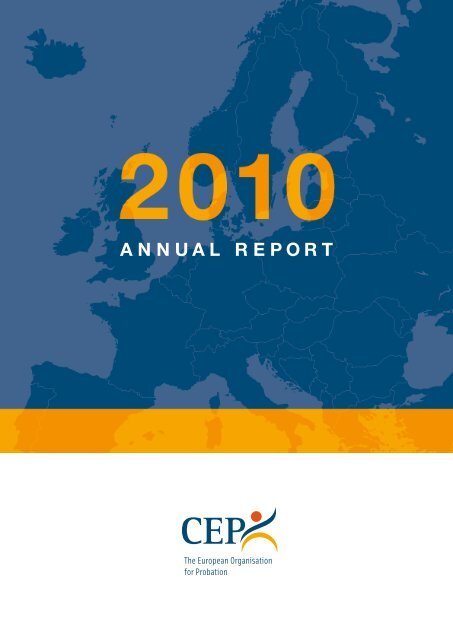

![AGIS2 Nov 08 Conference Report_[Version 2] - CEP, the European ...](https://img.yumpu.com/50764570/1/190x245/agis2-nov-08-conference-report-version-2-cep-the-european-.jpg?quality=85)
